Items
Tag is exactly
relationship
-
2021
At Home
The pandemic had caused us all to stay home, families were all living all day everyday together. For me this meant that I was spending more time with them, more than usual. Before the pandemic had started, my family ran on the same routine everyday, me and my siblings would go off to school, my mom is a stay at home mom so she would spend her time taking care of the house, and my dad would go off to work, he has his own construction business. The only time we were really home together as a family would be the hours my dad would be off of work from after around 7pm. When I was younger he would work many more hours, sometimes as long as 5am-8pm but the point is, he was barely ever home but to spend an hour or two with us and then he would sleep. I did have a good relationship with my dad and so many memories as well but the quality time wasn't really there. It is not like he didn't want to be around but it was that he wanted to work more while he was younger so that he could invest into his retirement and save up more while he can. Once the pandemic started, he was home with us much more. Of course this came with both pros and cons, such as having that quality time with him, but it also meant that there were much more disagreements since we were all together all day everyday. One of my favorite memories from those days were when we had ordered a whole lot of board games and jenga blocks to keep my younger brother entertained (and off of electronics as much as possible). My dad loves to bring in his construction wherever and whenever he can. He would take my brother's jenga blocks and make buildings with it and show off how he so thoughtfully made it so that it can actually hold weight and its not just good looking. The pandemic changed my dad's relevancy. Once lockdown was over, and he was back at work, he started working less hours making sure he would be home by 5pm or 6pm at most and he would spend his evenings with us again. The pandemic changed my life in many ways but my dad is always the first person I think of when I remember those days. He truly does try to stay as relevant in our lives as he can even when he is tired and it's great seeing the effort he puts in. -
2024-01-09
The Pandemic with my cousin.
During the pandemic and quarantine, spending time with my cousin and friends became a lifeline amid the uncertainty that enveloped our lives. The isolation brought us closer, forging bonds that were resilient in the face of unprecedented challenges. During the lockdown me and my cousin still got to hangout a lot in person. We would do fun things like swimming and going to Taco Bell at 12 AM. I also had some online friends so I would video chat with them very frequently to pass time. We navigated the challenges of the pandemic together, sharing our fears and hopes, creating a support system that felt indispensable. As restrictions eased, cautious gatherings with friends became cherished moments. Our small circle provided a sense of normalcy in abnormal times. We'd organize outdoor activities, maintaining a safe distance yet reveling in the joy of each other's company. Laughter echoed louder than ever as we found solace in shared experiences. Navigating the challenges of online learning, my cousin and I became each other's sounding boards, helping one another adapt to the new normal. Late-night study sessions turned into opportunities to connect on a deeper level, fostering a bond that transcended familial ties. Our friendship withstood the test of time, proving that even a pandemic couldn't extinguish the flames of camaraderie. We explored new hobbies together – from baking cakes and cookies to attempting DIY projects. Each shared endeavor became a testament to our resilience and adaptability. Whenever we couldn't go outside we would watch movies, make tiktoks, and play games. Even during the pandemic one of our favorite places to go was still open. It is called Shadybowl Speedway. We would go there with my dad and her mom and watch cars race for hours and eat amazing food from the concession stand and run around with our friends there while also cheering on our uncle and her brother. Whether it was trivia, board games, or multiplayer video games, our competitive spirits thrived, and the time spent together brought us together in ways we hadn't anticipated. As the world gradually reopened, in-person gatherings became more frequent, yet the lessons learned during quarantine remained etched in our minds. The value of human connection became more apparent than ever, and the simplicity of spending time with loved ones was cherished like never before. Reflecting on those challenging times, I realize that amidst the chaos, a silver lining emerged. The pandemic taught us the importance of resilience, adaptability, and the irreplaceable value of relationships. My cousin and friends became anchors in a storm, and the memories we created together stand as a testament to the strength of our bonds during those trying times. -
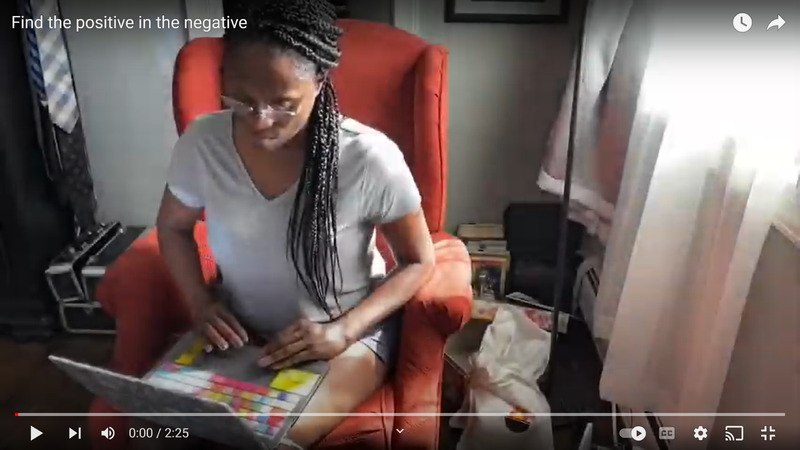 April 8, 2020
April 8, 2020Find the positive in the negative
a look at the everyday life of Gabriella Bartley during the height of the 2020 pandemic -
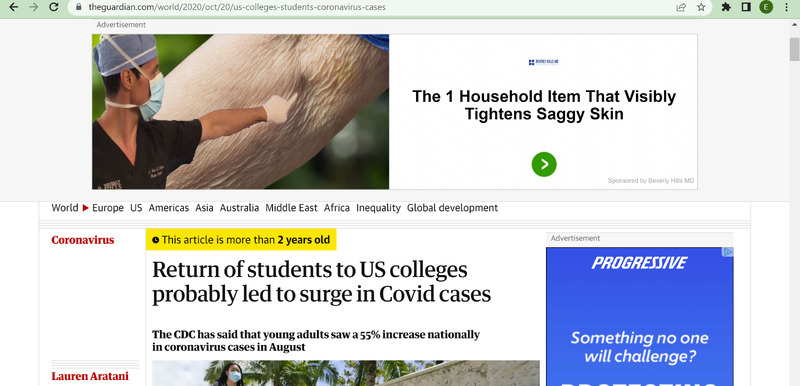 2020-10-20
2020-10-20How covid affected NYC?
Covid has affected everyone by the way you live your everyday life. Covid has affected New york city in many different ways , For example covid affected business to close down months including schools . Schools having to go remote . Another way New york city has been affected by the transit , The transit systems like the trains ,buses and commuter rail and ferries as a result to this the transportation has plummeted . For the subways in New York City it went down 90 percent and the buses went down 75 percent. The reason for this happening is people in quarantine and not going to work since some are working from home . Covid has affected health care workers. For example health care workers like doctors and nurses are around people who have it so they are more prone to get it. .This pandemic caused a lot of changes in the world. It caused everyone to be less social and not go out as much as it caused us to wear masks everywhere. It also caused a lot of people mental and emotional health to go down. For example there’s been a lot of social isolation which caused families to not be able to see each other as often. COVID-19 has impacted social mobility on child care cost and for families school dropout rate has increased due to fear of getting Covid. COVID-19 especially affected families due to not having jobs or working from home or being put on unemployment there’s been a big impact of Covid on families and family relationships creating a lot of tension and feeling depressed or not being united together. These pandemic parts of the population in different situations continue to affect people living in poverty situations with older people and disabilities. A lot of people have been put on unemployment and not being able to pay the rent. Covid has caused a lot of deaths and people could not be able to bury their loved ones. During The beginning of the year when the Pandemic was occurring depending on the situation of others some people were probably affected mentally Health care was provided to those who really needed it due to people not being able to pay for it and The state of new york lost money as well , It affected relationships and people got help by going therapy and staying connected to people . This pandemic affected many people personally. Covid has affected everyone's plan including travel because there's been travel bans and going to the airport has a lot of restrictions. A Lot of businesses are closing down to this pandemic by not giving income . Due to health care a lot of pregnant women had very high dress levels that affected their pregnancy . Which caused health care workers to be very aware of what was going on . Their risking their own lives to help us and young teens and kids were not able to fully able to enjoy the success of completing in graduating either high school such as prom or etc.it affected everyone's life and still is . This has caused a lot of stress and tension but has allowed people to be stronger in a sense and to appreciate the little things in life . Covid 19 has caused many hardships including loss of jobs . Some questions that still remain on this subject would be , When are things going back to normal ?, When is the vaccine coming out to prevent this ? When will this end ?. A message of hope i would say is everything will get better with time. The productivity has been slow due to employment going down ,People losing jobs . my personal experience with covid has become a learning experience . For example this pandemic has showed me to not take things for granted . -
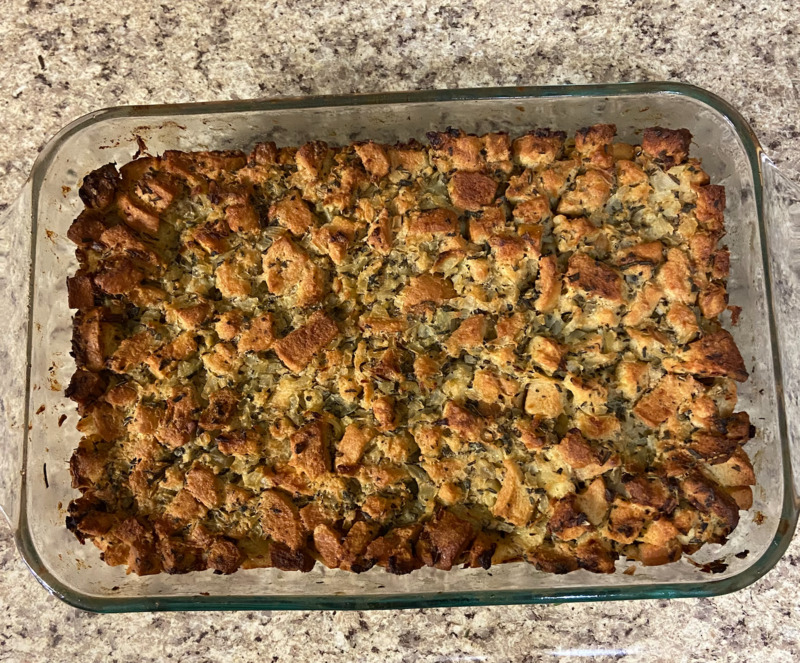 2020-11-26
2020-11-26Thanksgiving 2020
This was the homemade stuffing I made for Thanksgiving of 2020. Due to social distancing my family had in order to protect people, my extended family ate at two separate locations. For me, that meant going to my parent's place next door and dining with my aunt and uncle. My grandparents had their own celebration with other family members. One interesting twist to this was that we all ended up eating the same food between both houses because it was split up. This is why I ended up making a lot more stuffing than I normally would for Thanksgiving. In addition to this, I brought over some homemade cranberry sauce and homemade jam. I had learned to make canned jam during 2020, and I had some leftover to give. Everyone enjoyed the food I made and my aunt said it was some of the best stuffing she ever tasted, and she isn't really a big fan of stuffing. Sadly, the stuffing was not enough to ease tensions on the politics happening at the time. Other parts of the day included my family getting into a political discussion on the 2020 election. I had different views on it than my family did, so I left once that started. Later on in the evening, me and my husband went over to my in-laws. My sister-in-law was sick with COVID, so my father-in-law gave her food from the evening for her to take home. I was bummed about that, but people did not want to take their chances of getting others sick, which I understood. My father-in-law invited someone that year from Egypt for the occasion. It also turned into a political discussion there. I felt more comfortable voicing my opinions there than I did with my immediate family, but it was still draining. It made an otherwise okay evening into something that I don't want to think about. 2020 was a hard year for many people, and the election being so close to Thanksgiving made it very awkward. It has toned down since then, but I think people being locked down and exposed to constant social media and news coverage made it harder for people to actually discuss things. I think it's a good thing to be informed, but I do not believe the information overload many dealt with during 2020 was healthy. It even took a toll on me, as it made my mental health worse. Between the lockdowns, protests, and election, it was hard for me to take all at once. My only real solace was school and my husband, as both forced me to think of things not happening at the very moment. As a history major, I find it easier to think of events in the past than I do the present at times. It's why I really like the medieval period in Europe because it is far enough removed from the current era, so I am less likely to get heated about some of the topics brought up. With current events, I need to take a break at times. It was very obvious that the Thanksgiving from 2020 was not something that really made my mental health better. I enjoyed the food and the company, but I had a hard time wanting to discuss politics with people that I interact with regularly. It's one thing to discuss with strangers I might never see again, but completely another to talk about it with people that you need to interact with daily. Now that things are back to normal, for the most part, the tensions are not as high. I find myself being able to discuss politics again with some family members without it going badly. Overall, I would say that Thanksgiving 2020 was a good social experiment on how much overexposure to media and lockdowns can be detrimental to personal relationships. Seeing things behind a screen too often and being away from others takes a toll on humanity. This is why I was so glad when things started opening up again because people need to be out more and with others. As much as technology has helped us communicate, it still can't make up for the human interaction everyone needs. My own mental health has been much better since the ending of the restrictions and I don't want to go back to them again. -
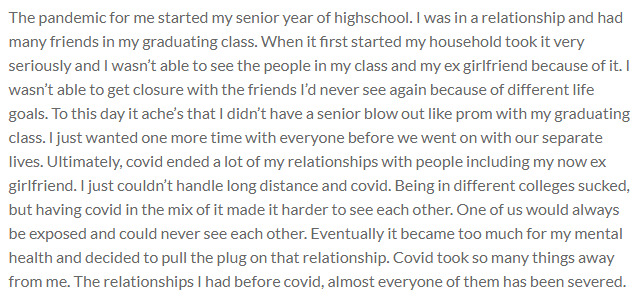 2020-09-01
2020-09-01Relationships during a pandemic
The pandemic for me started my senior year of highschool. I was in a relationship and had many friends in my graduating class. When it first started my household took it very seriously and I wasn’t able to see the people in my class and my ex girlfriend because of it. I wasn’t able to get closure with the friends I’d never see again because of different life goals. To this day it ache’s that I didn’t have a senior blow out like prom with my graduating class. I just wanted one more time with everyone before we went on with our separate lives. Ultimately, covid ended a lot of my relationships with people including my now ex girlfriend. I just couldn’t handle long distance and covid. Being in different colleges sucked, but having covid in the mix of it made it harder to see each other. One of us would always be exposed and could never see each other. Eventually it became too much for my mental health and decided to pull the plug on that relationship. Covid took so many things away from me. The relationships I had before covid, almost everyone of them has been severed. -
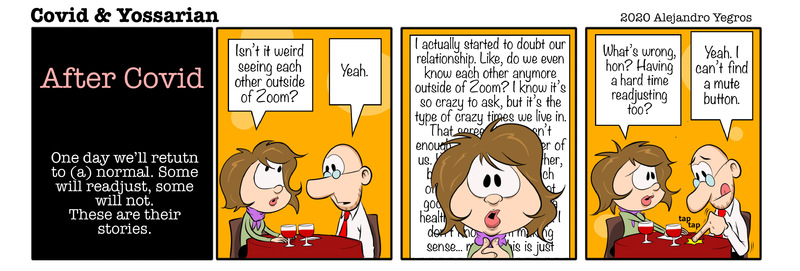 2020-04-18
2020-04-18After Covid comes...
A comic strip about Covid-19 -
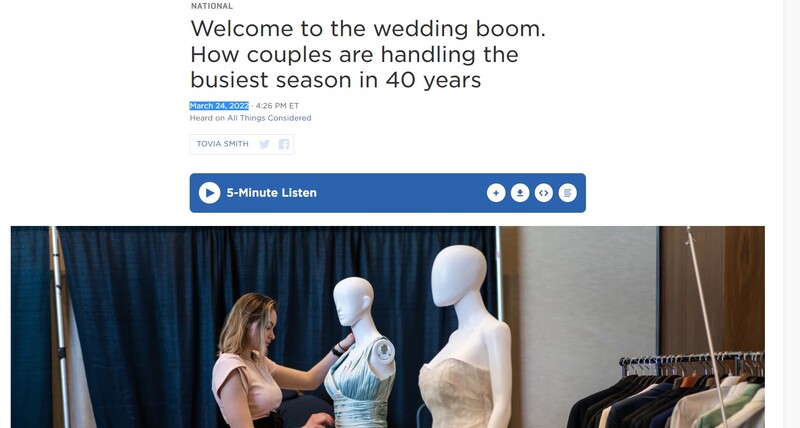 2022-03-24
2022-03-24Welcome to the Wedding Boom. How Couples are Handling the Busiest Season in 40 Years
This is a news story about the rising amount of weddings happening in 2022 after some couples have had to put them off. This story by NPR details changing wedding trends along with it. Wedding dress retailers such as David's Bridal say the demand for maternity wedding dresses is at a 10% increase. Wedding site, The Knot, has had a 25% increase. Financial stress in planning these weddings has also increased. Mandy Connor, a wedding planner, notes that one of her clients was hit with a 30% increase in overall cost between the contracted estimate and the final bill. This article does a good job at showing changes in wedding trends based on how retailers are reacting. -
2022-03-25
How COVID Changed my Marriage
I got married in May of 2019. When I got married, I had no idea something like COVID would happen and change the dynamics I had with my husband. COVID happened the first few months into our marriage. With it, my husband had to start working from home. I won't lie and say it wasn't an issue with my husband having to not be in the office anymore. I felt like I couldn't do as many things, as my husband had to talk to clients and go to meetings, where I couldn't be too loud. Another thing I wasn't used to at the beginning of all of this was seeing my husband far more often than just before or after work. With that, I had to learn to communicate better with any issues I had instead of bottling it up as much. As we were together more, I had to learn to accommodate for that. From reading news stories early in 2020, not everyone was able to make their marriages work, and ended up getting divorced after some spouses were made to work from home. I think that is one thing people aren't always aware of being an issue in a marriage. Sometimes too much time together can have the opposite effect, especially if communication was already shaky even before the pandemic. There were a few times I did get angry with my husband for not feeling like I was being understood. With him being at the apartment more, there were more opportunities for me to get annoyed with him. At some points though, the anger wasn't even really his fault, but my own for not dealing with the lockdowns well mentally in addition to forgetting to take medicine or do other tasks. I had to learn to speak more openly about these issues rather than letting them linger. Funnily enough, it wasn't until February of this year that we both really learned to talk to each other more productively. The big fight we had was partly from me feeling jealous of how my husband would talk to his friends more often than he would me, as for a while by that point, we had gotten into a routine during COVID of both of us being on our phones way more than we should be. We later had to come to the agreement to set aside specific time for each other without using our phones. It has already been over a month since that change, and the relationship has improved drastically. Some of my habits that I made to help cope with COVID and general anxiety issues kept me from having as solid a relationship with my husband. Intimacy was another issue that came up due to my husband working from home. Even though we physically saw each other more often, we didn't kiss nearly as much as we used to. I think that sometimes kissing goes to the wayside if people become too busy. This was something we ended up having multiple discussions on, as we wanted to show more affection with each other, but did not think to do it. Overall, the biggest changes that happened in my relationship with my husband because of COVID was the way we communicated. Being together in person more often meant we had to work through multiple issues we had prior to COVID or because of COVID. Being alone together more often may seem like an ideal situation to some people looking from the outside, but with it can bring a host of new issues. Some people during the pandemic learned this the hard way and ended up getting divorced. The problems me and my husband have had were not unsolvable, but they take some maturity to work through without it causing resentment. I think sometimes of what it would have been like if COVID never happened early on into our marriage, and now I am glad some of it did, because I have become a better wife and am able to meet my husband's needs better than before. Life really did hand me one very tart lemon by having to deal with a pandemic the first few years in marriage, which many say are some of the most vulnerable years for a couple. That tart lemon has since been made sweet, but only because both of us were able to recognize problems and figure out ways to help each other. -
2022-03-24
High Functioning Autism during a Pandemic
For those that are somewhat familiar with autism, one might believe the pandemic was perfect for someone like me. People were encouraged not to speak to each other in person, everyone had to keep a distance, and masks were everywhere to conceal the face. These things, for me, were what I dreaded. I had a pretty good routine going before the pandemic. I had just graduated college with my bachelor degree and was getting used to being married. I was also caring for my grandma as one of my first jobs. I got to get up every morning, earn money, and make sure my husband was well cared for. My husband and I would go places for date nights and we would sometimes do spontaneous things like midnight grocery shopping for ice cream. Things were just carefree. Then a few months into our marriage, things changed a lot (more for me than for my husband). I enjoyed going to church in person for both my spiritual needs and for the social aspects it gave me. Once March 2020 happened, I couldn't go to church in person. Church was online and it became harder for me to get into it and actually concentrate. I then just stopped going altogether for a while because I wanted to have that human connection I was missing. Eventually, I was able to go to church again, but I had to wear a mask. I dealt with it even though I didn't like it. It was sad to see so many people's faces covered by cloth. It made it feel like I couldn't connect to people as well. My social skills aren't terrible if everyone wears a mask, but I'm more likely to miss certain cues or tell when someone is joking. I focus on the mouth a lot when people talk, so not getting to see mouths was bothersome. Other elements of my life changed, and autism made it worse for me in some ways. Due to my older habits of wanting to go places more often, the stay-at-home orders that occurred at the very beginning made me feel like a prisoner and that I couldn't choose things for myself as often. This increased my anxiety a lot, to a point of a mental breakdown. My husband was luckily very understanding of my issues, so I was eventually able to recover once I gave myself more work to occupy my time with. Of all the COVID rules I had to follow, social distancing was one of the easiest things for me, but only in a few ways. I was fine with talking in person from a distance, as I already do that naturally, but I was not okay with having to talk to people more often through online video like Zoom. Zoom feels so unnatural because seeing people through video is not the same as seeing them in person. I didn't have to do it very often, but I was greatly unhappy at the annual family Christmas celebration in 2020 was all on Zoom. It didn't feel as festive as I would have wished. Autism in general has made COVID much harder to deal with, and sometimes I think that if I didn't have it that I could have adjusted better to the abrupt changes COVID brought into my life. I did learn some things though. I learned that I need a set routine to get things done, and that if I have a problem, I shouldn't feel afraid to be more honest about it. With my husband having had to work from home due to COVID, both of us have had to work on better communication skills. I don't think everything I've learned from this experience has been bad, but it's also not something I want to go through again. -
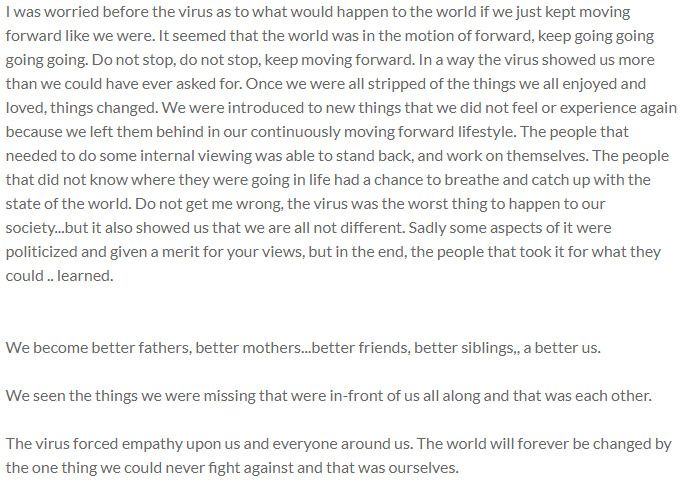 2022-03-13
2022-03-13The Virus That Slowed Us Down
I was worried before the virus as to what would happen to the world if we just kept moving forward like we were. It seemed that the world was in the motion of forward, keep going going going going. Do not stop, do not stop, keep moving forward. In a way the virus showed us more than we could have ever asked for. Once we were all stripped of the things we all enjoyed and loved, things changed. We were introduced to new things that we did not feel or experience again because we left them behind in our continuously moving forward lifestyle. The people that needed to do some internal viewing was able to stand back, and work on themselves. The people that did not know where they were going in life had a chance to breathe and catch up with the state of the world. Do not get me wrong, the virus was the worst thing to happen to our society...but it also showed us that we are all not different. Sadly some aspects of it were politicized and given a merit for your views, but in the end, the people that took it for what they could .. learned. We become better fathers, better mothers...better friends, better siblings,, a better us. We seen the things we were missing that were in-front of us all along and that was each other. The virus forced empathy upon us and everyone around us. The world will forever be changed by the one thing we could never fight against and that was ourselves. -
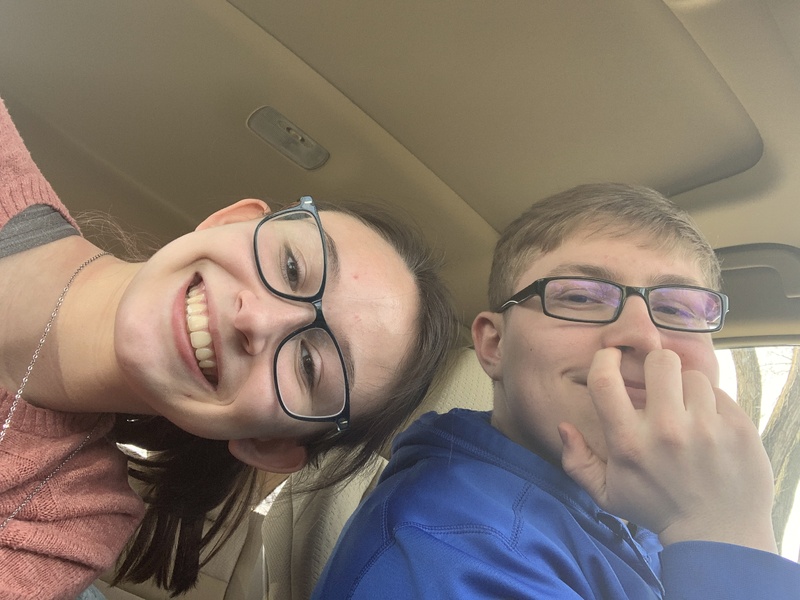 2020-03-14
2020-03-14Covid Distance
Me and my boyfriend were dating for about a year and a quarter when COVID hit, he's my best friend we were inseparable. Until covid hit, both of our families bad high risk members and it was to risky to see each other due to it putting our families at risk, it was about two months until I could see him, just see him and around three months till I could even give him a hug. I remember the first time we saw each other since the lockdown he was in his car and had to drop off something for my mom. I had to stand 7 feet away on the sidewalk and he wasn't allowed out of the car, it was heartbreaking. To see one of the people you love most in life for the first time in months and not be able to give them a hug, I just needed a hug. We are still together today, but this was hard on us as it was on many to not be able to to see or hug a loved one to protect one another is really hard even if it is to keep each other safe. -
2020-06-19
The bracelet my mother made
During the peak of the pandemic, my mother learned to make intricate bracelets. She made me one, and I have not taken it off since. In a way, it symbolizes my relationships with my family during this hard time. -
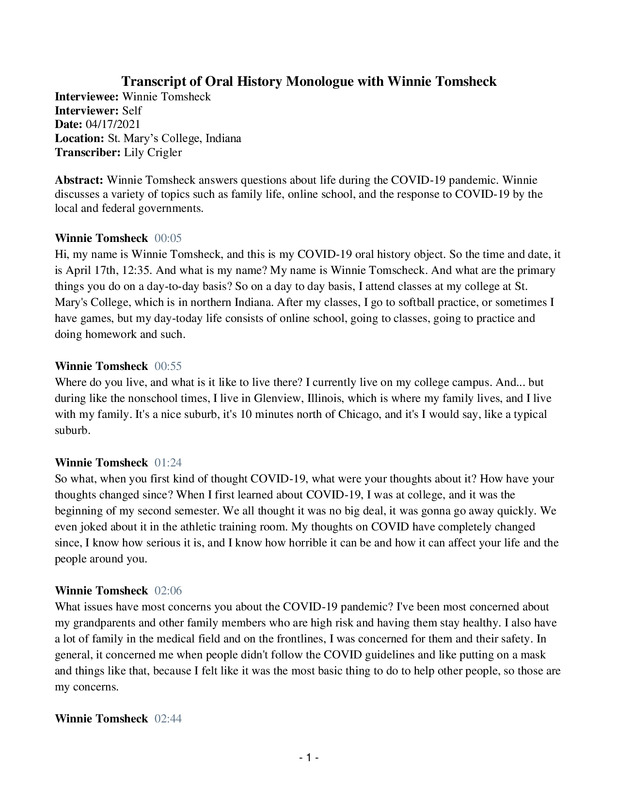 04/19/2021
04/19/2021Winnie Tomsheck Oral History, 2021/04/19
In this monologue, Winnie Tomsheck answers questions relating to COVID-19. -
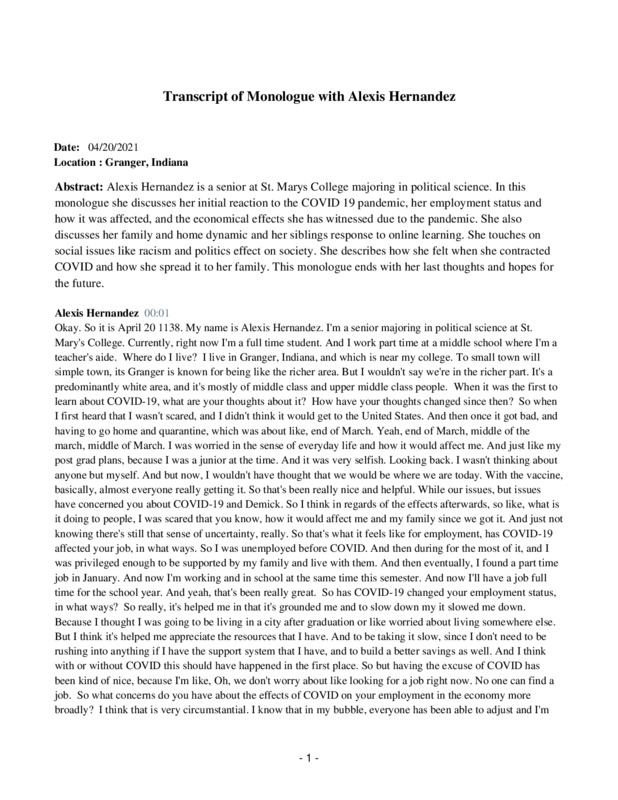 04/20/2021
04/20/2021Alexis Hernandez Oral History, 2021/04/20
Alexis is a senior at St. Marys College majoring in political science. In this monologue she discusses her initial reaction to the COVID 19 pandemic, her employment status and how it was affected, and the economical effects she has witnessed due to the pandemic. She also discusses her family and home dynamic and her siblings response to online learning. She touches on social issues like racism and politics effect on society. She describes how she felt when she contracted COVID and how she spread it to her family. This monologue ends with her last thoughts and hopes for the future. -
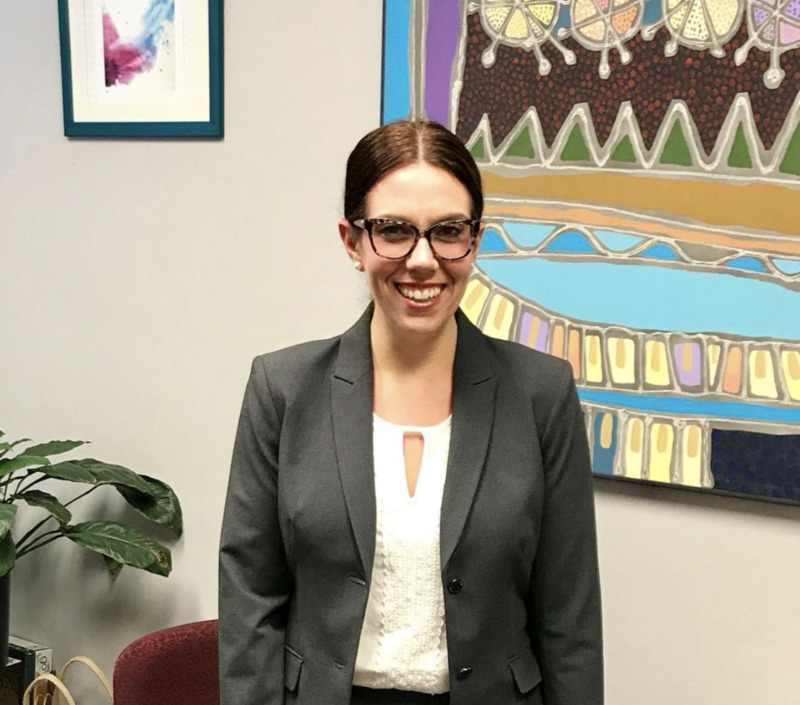 2021-11-03
2021-11-03Oral History: Clare Acosta
Through this oral history, Clare Acosta and I develop a conversation about both the Community Engagement office work and the program of Empower: Ecuador. The conversation was specifically focused on the before and after of COVID-19 and also what was learned from the process. It is a very deep conversation that I really enjoyed and know that Clare also did. -
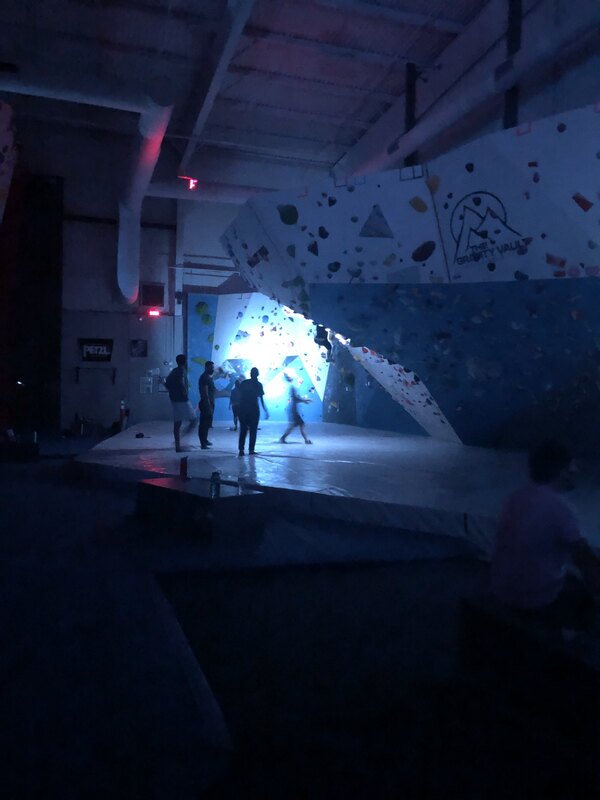 2020-10-31
2020-10-31Connecting through Climbing in the Pandemic
Just prior to the pandemic, I got seriously into rock climbing. For me, not only it was a much more fun way to work out, but it is absolutely a social sport. Everyone at the climbing gym was and continues to be extremely friendly, and you can simply strike up a conversation with anyone by simply asking what routes they are working on so that you can help one another find the most efficient way to reach the top. As all the routes are graded, just watching yourself improve and working on harder routes is an amazing feeling. With the outbreak of the pandemic, however, the gym closed until September, and I felt like such an important piece of my life went missing. While it was hard losing an activity and social outlet like that, I like trying to find silver linings in the difficult times. Even though it took me a while to come to this conclusion, I realized that it took the pandemic and losing it to truly appreciate the people there and sport itself. Ironically, I can almost contribute the pandemic to my continued obsession with climbing, even if it did rip it away from me for a few months. Attached is a picture of the first event back at the climbing gym, which was a lights-out event for Halloween where you could only use headlamps to see where you were going. -
2021-09-08
Relative Distance
A couple of weeks before lockdown began in March of 2020 I had reconnected with someone I met in college years prior. We went on a few dates before I left to study abroad and nothing developed further, but we had struck up a conversation over text and had made plans to meet in Boston the weekend that New York City declared a state of emergency. Needless to say, we never met for drinks that weekend, yet we talked every day without fail for the rest of 2020. Our initial conversations typically revolved around the different developments of the pandemic but we started to get to know each other as text conversations became phone calls then video calls. Our connection grew as a reaction to the large amount of time we suddenly had and by a new reality where distance meant something very different than before. Although I had not seen him in person for almost 2 years, he was there for me in the only feasible way a person could be during that time. He was there through personal tragedies or minor irritations in an evolving and confused stretch of months. Sometimes we did not have much to say at all - I deferred to topics like what I cooked for dinner or we compared notes on the new show that we had just watched. I called him first when my pandemic furlough turned into a lost job. I called him first when l was chosen for my Executive Assistant position many months and numerous applications later. He texted me on my first day of remote work to wish me luck and he consoled me over video chat through my tears of frustration and defeat as I navigated the new reality of learning a remote position in the typically highly visual and highly performative art world to which I was accustomed. On one of these calls he told me that he had to go back home to Italy. There were many more months of having a friendship and possibly relationship in a state of limbo with this person who now knew me better than most. We had become close through untraditional means; it felt strange at times but then again so did everything else. He came back to the United States in January of 2021 and we have been dating ever since. Connection to others took on a new meaning during that year. How we interacted and who we kept in contact with changed. Speaking with him was something I looked forward to and it gave me a sense of routine. More importantly, our conversations provided a dose of levity and joy to each day throughout a very tumultuous year. -
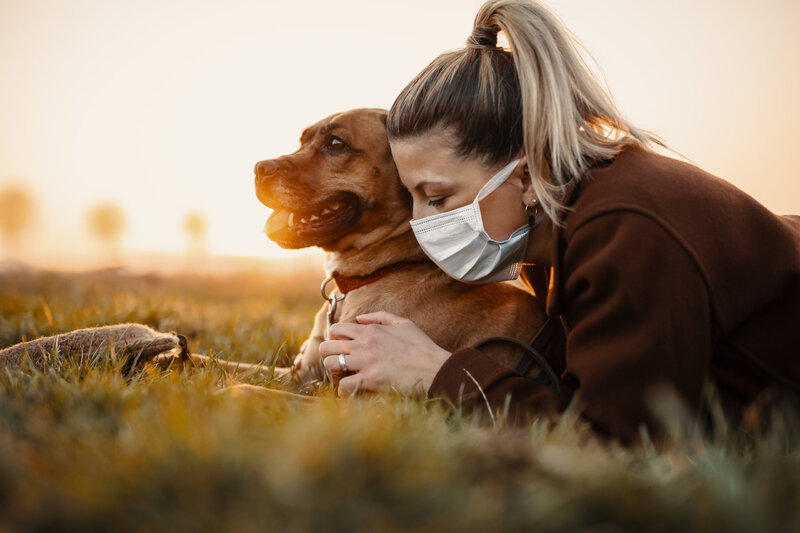 2020-10-27
2020-10-27New survey suggests human-animal bond stronger than ever amidst pandemic, lead-up to U.S. election
- As people navigate feelings of uncertainty due to the current global pandemic and U.S. election on November 3rd, one thing is clear: pets are playing a more important role in people's lives than ever before. In May, Banfield Pet Hospital released a survey looking at the impact of people quarantining at home with their pets. Today, the practice unveiled a follow-up survey that suggests the human-animal bond is growing even stronger and a shared love of pets can bring people together. -
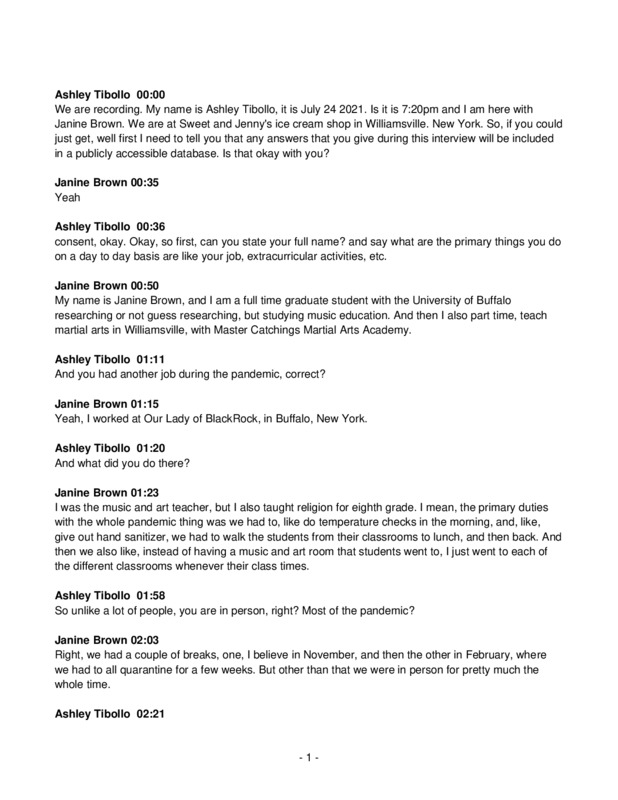 2021-07-24
2021-07-24Janine Brown. Oral History, July 24, 2021
In this two-part interview, Ashley Tibollo interviews Janine Brown on how her life was impacted by the Covid-19 pandemic. In the first part of the interview, Brown discusses how her last year of college was impacted and about her transition to remote teaching. She discusses her fears of the Delta variant, what sources she uses to get her information and what her feelings are regarding government action. She also discusses family life and how she was affected by the quarantine. She ends this part with her hopes for the future. In the second part of this interview, Brown discusses her decision to move in with her boyfriend right before quarantine and what it was life navigating a new relationship amidst a pandemic. She also discusses her pets and how their moods changed as her life changed. She discusses the difficulties of house hunting and the ways that the pandemic has affected the market. -
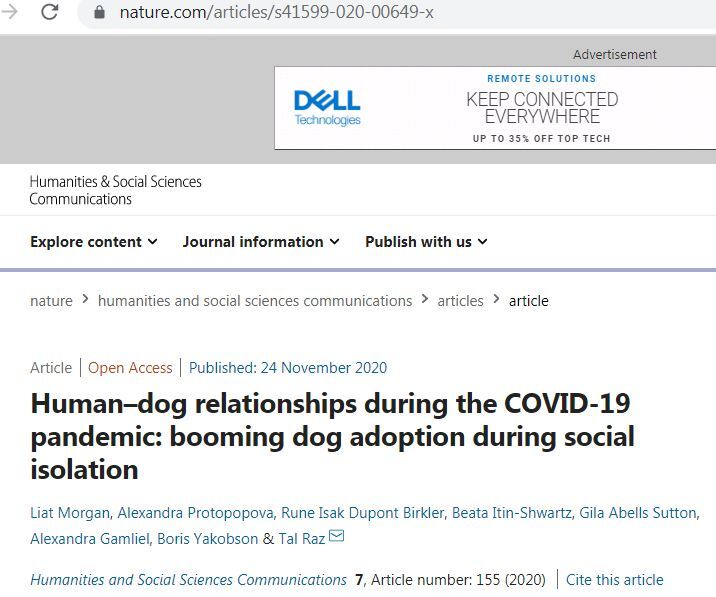 2020-11-24
2020-11-24Human–dog relationships during the COVID-19 pandemic
A study done in Israel looks at the relationship between humans and dogs during the pandemic. The study finds that, like in the United States, there was a significant increase in dog adoptions in Israel during the pandemic. They also found a direct correlation between the mental health of the owner and the perceived quality of the life of the dog. -
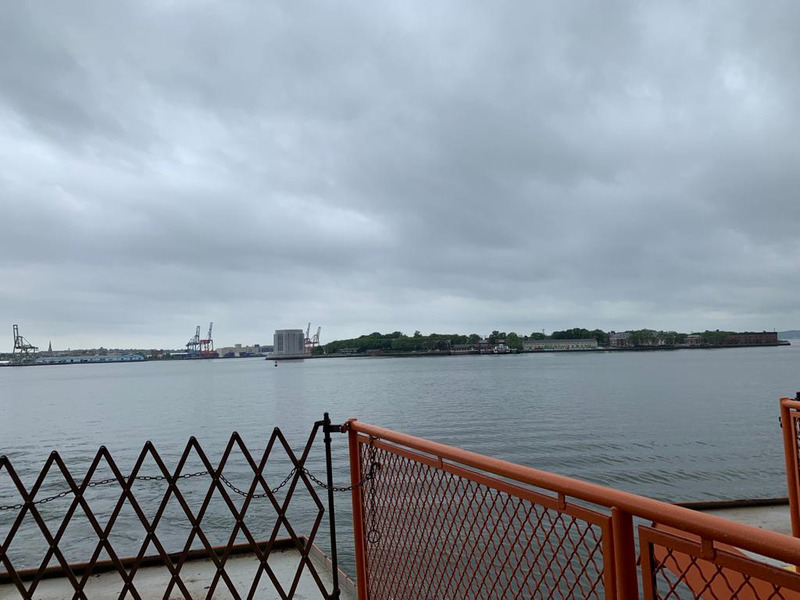 2021-05-29
2021-05-29COVID-19 and Mental Health
I took this picture on May 29, 2020, at 10:35 am. Why I choose this picture? This picture reflected my feeling in 2020. After months without going outside, I was heading to Staten Island to visit my aunt. I remember that I had anxiety even to open the door of my apartment. Whenever I went outside, it was close to my apartment, and my skin started to itch for no reason. My family used to watch the news the whole day. I was tired of listening to the report. Besides, during COVID-19, I was having an awful time. A few months ago, one of my friends died, and It was depressing for me. Before she died, I let my ego break the relationship between us. I refused to call her or text her because I was tired of looking after her. I remember my father told me to call her because I did not know what was happening with her. I ignored him. Riding to Staten Island that morning made me remember the hard time that I was going through. The day that I went to Staten Island, it was cloudy and dark. I thought that the ferry would sink into the water. When I got to Staten Island, it started to rain, and I did not bring an umbrella. I was mad, but it was my fault for not checking the weather. I compare that dark and desperate day with the mourning of my friend and the pandemic. For months, I felt guilty and thought that I did not deserve anything good in my life. The worst of all of this is that I did not have anybody to talk to. I was in quarantine for months, and it affected my mental health. I had no desire to continue college and my business. I used to cry a lot, and all I wanted was to talk to someone about how the pandemic and the death of my friend affected me. I had desired to go to the Dominican Republic, but I could not go. I think that this source can help historians because they can get to know about different perspectives of people during the COVID-19 pandemic. They would notice the anxiety that not only I went through, but everybody around the world had been through. My neighborhood was affected significantly. Some of my neighbors got COVID and died from it. I know that many people saw themselves as the picture. They thought that everything around them was going to end. They thought that they would be stuck in the pandemic forever. -
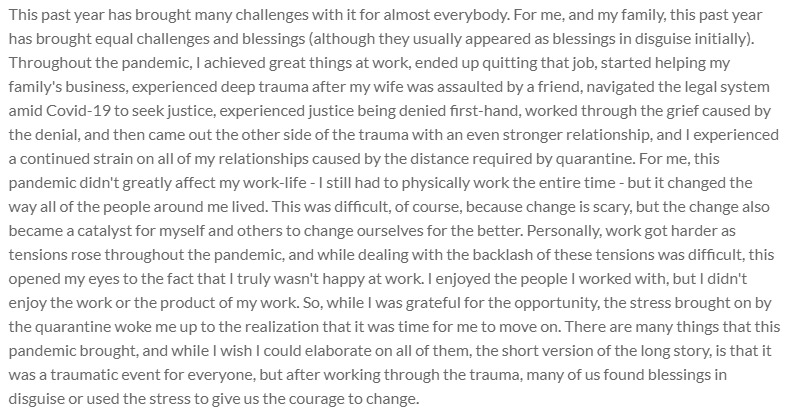 2021-04-23
2021-04-23The Dorbin Journey
This past year has brought many challenges with it for almost everybody. For me, and my family, this past year has brought equal challenges and blessings (although they usually appeared as blessings in disguise initially). Throughout the pandemic, I achieved great things at work, ended up quitting that job, started helping my family's business, experienced deep trauma after my wife was assaulted by a friend, navigated the legal system amid Covid-19 to seek justice, experienced justice being denied first-hand, worked through the grief caused by the denial, and then came out the other side of the trauma with an even stronger relationship, and I experienced a continued strain on all of my relationships caused by the distance required by quarantine. For me, this pandemic didn't greatly affect my work-life - I still had to physically work the entire time - but it changed the way all of the people around me lived. This was difficult, of course, because change is scary, but the change also became a catalyst for myself and others to change ourselves for the better. Personally, work got harder as tensions rose throughout the pandemic, and while dealing with the backlash of these tensions was difficult, this opened my eyes to the fact that I truly wasn't happy at work. I enjoyed the people I worked with, but I didn't enjoy the work or the product of my work. So, while I was grateful for the opportunity, the stress brought on by the quarantine woke me up to the realization that it was time for me to move on. There are many things that this pandemic brought, and while I wish I could elaborate on all of them, the short version of the long story, is that it was a traumatic event for everyone, but after working through the trauma, many of us found blessings in disguise or used the stress to give us the courage to change. -
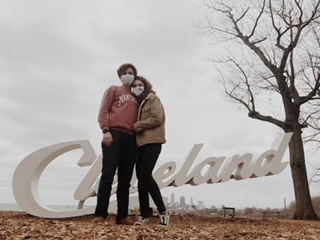 2020-11-21
2020-11-21Romance Despite the Pandemic
Despite the pandemic and all it entailed, I was able to meet my current boyfriend and fall in love. He has made this uncertain time, incredibly better. -
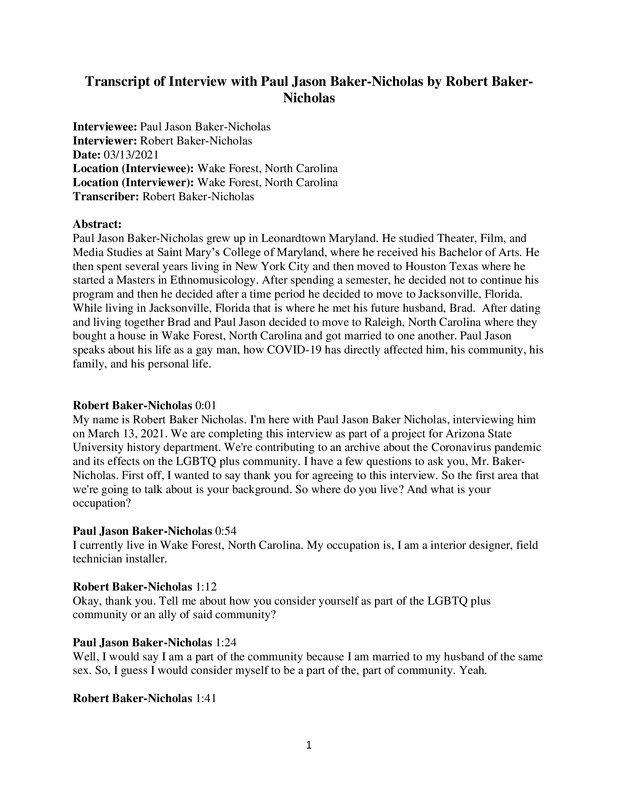 03/13/2021
03/13/2021Paul Jason Baker-Nicholas Oral History, 2021/03/26
Paul Jason Baker-Nicholas gives an oral history interview about how COVID-19 has affected the LGBTQ+ Community. -
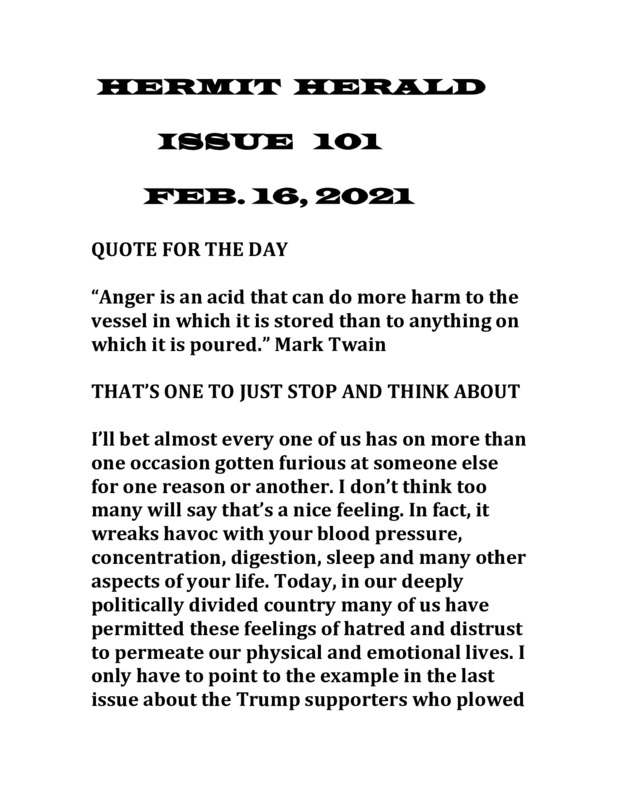 2021-02-16
2021-02-16HERMIT HERALD, ISSUE 101
TRUMP,impeachment wrap up -
2021-03-06
Queer During Quarantine
Transcript of Interview with George Carter by Jessica Carter Interviewee: Lauren Barney Interviewer: Jessica Carter 3/6/2021 Location (Interviewee): Charlotte, NC Location (Interviewer): Phoenix, AZ Transcriber: Jessica Carter This transcript has been provided by Otter.AI w/ a 2nd pass for accuracy. Abstract: This is an interview I did with my friend Lauren about being queer during COVID. JC: All right. Hi, my name is Jessica. I'm an undergraduate student at ASU enrolled in history 494. The date is March 6, and the time is 3:01pm. I'm speaking with Lauren Barney, I wanted to ask you a few questions about your pandemic experience and how that has related to sexuality and gender expression. But before I do, I'd like to ask for your consent to record this response for the COVID-19 archive. The COVID-19 archive is a digital archive at ASU that's collecting pandemic experiences. Do I have your consent to record this response and add it to the archive with your name? LB: Yes JC: Perfect. All right, first, can you tell me your name, age, gender identity and sexuality? LB: Yeah, we do you want my last name too JC: No, it doesn’t matter LB: Lauren, Lauren, I'm 21. Um, I am gay. And I guess a woman. JC: For the archive. I'll also say Jessica Carter. Some variety of gay, non-binary, they/them pronouns 21 as well. Alright. pandemic, thinking you were bi then came out a lesbian? What were, like some of the, I guess, kind of moments that made you think that. LB: Okay, um, I guess a couple. Um, this one's really bad. Definitely Tik Tok. Like, the algorithm, I think just knows something's. And definitely I was like, this is strange. And then, the person I was dating at the time, was, like, literally said to me, like, wow, Lauren, you seem to be much more interested in women than you are in men. And that's when I had a mental breakdown silently to myself. And I was like, Fuck, I would say that was the main one. JC: Yeah, and like, something kind of, like interesting about the Tik Tok algorithm, right? Is that, like, it's based off what you yourself interact with? So it's like, not even something that you can really control? LB: Yeah, I think because it was so subconscious. It's not like I like would purposely like click on certain videos or stay longer on some videos. tik tok just, like, detected all those things, and was like, Wow, JC: so much harder to regulate your behavior when, like, it's on an app. Like you're not like consciously being like, I have to be straight now. LB: Yes, I would agree with you. Also, cuz no one sees your tik tok JC: Yeah, like nobody sees you have like videos, nobody sees what you're interacting with. So it's a completely neutral way for you to consume media, and it becomes so targeted because that's what like social media is now right. Just targeted. advertising. Yes. Um, what? Like, as you were starting to realize while you were still with your ex, though, so what are kind of some of the holdbacks that you had before like coming out and then living your life as a, like a queer person? LB: I think it's like scary when you like, have a perception of yourself as like one thing for so long. That it's like, hard to accept that that's wrong. I think especially when it's because I have had, like, a lot of like, straight passing privilege because I was dating a man, even though I thought I was by like, to just completely be like, actually, I'm giving all that up is like kind of scary. I think there were some other complicating factors for why it was really difficult to leave that relationship specifically. JC: Yeah, and when I like straight up asked you if I was if you were only still with him, because you just didn't want to be a lesbian. LB: Yeah, that was hard to hear. JC: I will be honest, I couldn't imagine going to a wedding with you to what I needed. Yeah. There was no that wasn't in the cards for me needed to not be an occurrence for you to marry him. LB: No, that would have been very bad. I would have been unhappy for the rest of my life as well. JC: So do you think that it's like a specific type of treatment that you accepted, like you were willing to accept, like so much worse treatment than you probably would now in a relationship because you maybe subconsciously wanted to keep that privilege? LB: I think yes. Um, I think for me as well like because I wasn't actually like in First in any man, like the idea of like, leaving, and then dating a man, like, again, was just like something that I, it didn't seem like a thing to me like, it just did not seem like an option. So I was like, Well, I guess we'll just stay here and, you know, have a very bad time. JC: Yeah. How do you think the pandemic specifically kind of forced you to confront? LB: I think a couple ways. I think that because I couldn't go anywhere. And I was living with this person, it was like, I saw that him like, every day. And I think that in and of itself, like, makes apparent a lot of issues. Um, I also think that like, because I was really limited in the number of people I could see because of COVID. Like, there wasn't anyone else that I had to, like, perform straightness for, like, when I was in Texas, like, I didn't have to, like see my family, or like my grandma, and like, behave and look like a certain way. And like worry about, you know, what would my grandma say, honestly, he's probably a little homophobic, but that's a problem for later. JC: Um like, when I was in Georgia, for that ethics bowl thing, I met up with my great aunt and uncle and we got lunch. And I'm, like, losing it, because the only thing I have is men's clothing. And like that really floral Express shirt, and I'm like, Oh my God, is this gonna look feminine? Like for this to like, be okay. LB: Yeah. And, yeah, definitely. JC: Like, because once you start to understand a lot of like, sexuality and gender as being a performance so much for other people, as opposed to yourself and kind of break some of that stuff down. LB: Yeah. I think also because like, when I like before the pandemic, and was like, interacting, like I could, like go out and like meet other queer people. And like other people who were like any identified as like LGBT, but like, during the pandemic, that's like, not possible. So it felt like even more like I was cut off from like, that aspect of myself. And it was like, What is happening here? Something is not right. JC: ah. And I recently just read the lesbian master doc, but like one thing that's like really big is like compulsive compulsory like heterosexuality. Yeah, I thought “I'm too smart.” LB: I read that as well. And that was not I mean, I don't know if it was a good or a bad time. Like, I think on one hand, like, it's a it was good for me to read it. Because it like helps me to be like, this is real. You're not just like making shit up in your brain. That document is Thank God for that document. JC: It's like really helpful. And it's like, caused a lot of reflection for me too. Because, like, for me when I was like, I guess I would like be with a man because like, I've, like, had what I thought or like emotional feelings for men, but like, on reflection, like all really like, mediocre men, like men that I probably would not, like ever be happy with. Yeah. Because like, my perspective is like, well, if somebody like needed me to, like, if the world was gonna end, I guess I could. Yeah. But like, I don't know, like, also just like authenticity, testing your queerness to try to have, like, fully, like, get out of that, if that makes sense. LB: Yeah, it does. I mean, I think for me, like, it's a lot easier now. Because like, back when I thought I was bi. Like, this was like a regular thing. I would literally have like, bouts of anxiety of like, I feel like I'm not gay enough. Like, I don't even know if that makes sense. Just that like I wasn't being perceived as queer. I was just being perceived as straight, which is like fair, because I was in a relationship with a man. And so it like that, looking back on that now, like, makes me realize, like, clearly something was wrong. And like, I knew it was wrong. I just, like ignored it. And so now when I try to authenticity, test myself, I think it's, like, easier to look back on that and be like, no look like, it's fine. JC: Yeah, and it's like, I don't know, because like, the like, the experience of queer women is so different than, like queer men. Do. Sorry. I just I was just saying that like the difference of like queer women is so much different than that of queer men because it's like a relationship that is just not for men in like a patriarchal society where almost like everything is for them. LB: I agree. I think it's like really hard to get out of that like priority. tising relationships with men. Um, no, I agree. I think that's why partly why I feel like such a disconnect from like, womanhood is like, what? I think society views is like what it means to be a woman like I can't exactly access that very easily. JC: Yeah, and like I think the Contra points video like does a really good job of like explaining that because like queer like Butch women, like especially being terfs was like one not something that I was expecting. LB: Yeah JC: But the fact that they feel like they need to, like double down on their femininity that they've constantly been forced to defend as opposed to, like, trans women who they believe just opting into womanhood is like an easier experience. When and I don't know, like, I guess starting to talk about like, gender expression is that compares with like, being queer. Like, for me, a lot of it's been, like, come to been becoming comfortable, like identifying myself as like a trans person. Because like, if you remember, like, I didn't always really, like claim that label. LB: Yeah, yeah, I remember. JC: And just like, I don't know, understanding that and like, what that means, because like, I feel like I have to, like have like, a hard definition. And getting comfortable with knowing that I do. Yeah. Have you done any, like, specific reflecting on like, gender identity stuff? I mean, I have, LB: I mean, I think for me, the reflection is just like, more so been about my sexuality. I'm like, what it means to be a woman because I think it's like, fundamentally different, like, as a lesbian, to be a woman than it was to be a straight woman and be a woman or a bisexual woman and be a woman. Like, I think that's the part that I have a hiccup on and say, like, Well, I suppose. I think that's been kind of the bulk of my thinking JC: My Tik tok, I'll get a lot of videos about break the way that like gender expression for women or for lesbians is like, so fundamentally different than for everybody else, right. And then, like, contrasting that, with how we relate to like, other queer women, if that makes sense, and like building community out of that. LB: Yeah JC: I don't know. That's just something that I've kind of been thinking about with regard to gender. LB: Wait will you explain that a little more. JC: Yeah, just like, because like, we've talked about, like our opinions on how there really is like, no LGBT community, because everybody's experiences so varied. Yeah, but like understanding that like lesbians relate to by women and that there is like that attraction to women, which, like, oftentimes, you have to fight about against being produced as a commodity for men. And then, like understanding like our own, like experiences is so different from that of by women because they still feel validation and can like be in relationships with men. LB: I would agree. Yes, I would agree with that. I mean, like lately Tick Tock has felt like it's a good idea to put on my for you page like videos of these like bi women who just like, wish they were lesbians or like, one day, like, they were like, I don't know, I saw this like specific one. And it was a bi woman being like, somedays I just like wish I was a lesbian. And then some days, I'm like, oh, but this man is hot. And I'm just like, this frustrates me to no end. And I wish you would not make this video. JC: Like, no, yeah, I used to get a lot of those videos. Like it's not easier. LB: Its harder JC: No, yeah. Because like, then you have to deal with like all other stuff. And there's not like there's a difference between the myth of like the greedy bisexual versus the predatory lesbian. LB: Oh, yeah. That Yes, I would agree. JC: One of those. Like, I'll even rank them one of those is explicitly worse and it's not the bisexual. LB: No, I agree. And like I also think that there's like a distinct difference and like, how I related to society when I was like, thought I was bi versus like, now like, I guess this is just like I have to like specifically like ask my therapist like when I first met her, like Are you okay with gay people? Because I live in fucking North Carolina? JC: And yeah. No, yeah. And I've been looking for one to be like an explicit statement on the website. Yeah, I use that all. I'm trying to get like insurance cover therapy. LB: Yeah, I am paying out of pocket for this very nice. She is said she's on the LGBT, whatever one of the acronym letters, and Huh, I don't have to have insurance or because I'm still on my parent's insurance. And there is no way I can be like, Hello, mom and dad, I need to go to therapy, and it's going to be on your insurance because I have some issues, because that is not an option. It's just, it's way more difficult. It fucking sucks. JC: Yeah, and like as compared to me, like my parents, like, want me to get therapy. But like, for me, it's just like, have conversation and like so much family stuff too. Because like my cousin like, Dean, he's like trans. LB: Yeah. JC: And like he was just so assuming that the family was going to be accepting of him. And that's crazy to me. LB: Yeah, JC: when I was 14, I realized I was queer. Like, I did not think I was gonna have a family. LB: Yeah. JC: And he's just like, so optimistic. So also like, trying to be this like, queer role model of positivity. LB: Yeah, I agree. I think that's really hard as because my, one of my siblings is like bi and she's like, not really out to like my parents. And it's like, hard. Because like, I obviously came out first, just to my parents, not to my grandma. But it's like when I talk to her, like, we're both like like because my grandparents on my dad's side are like Trump, Republican. They only watch Fox News kind of people. Like my aunt voted for Trump. And it's like, this. I like danger. JC: No, but like, my Aunt that but like, she's raising my cousin and like, apparently she's like, cool with it. But like, contrasting the political with the reality is so, so difficult to Yeah. like, also, like queer people have such a valid reason to be so wary of therapists and doctors. Like I don't want to get sent to pray the gay away camp, you know? Like, I'm an adult now. So that won't happen to me. But that was a real fear I had when I was younger. LB: Okay, did you have? Did you get your wisdom teeth out? Okay, on a scale of like, one to 10 how terrified were you that you were going to like accidentally come out while you were, JC: Oh I got my wisdom teeth out when I was 20 LB: Oh, shit. Really? JC: Yeah We waited a hot minute. No, but like I was really worried that for I guess, like for the gender identity stuff. I was concerned about that. Because, like, I think my parents would be accepting but I can't even begin to imagine how I'm going to explain what non binary is to like, to like 60 year olds, like I don't. LB: I tried with my mom. She just like, refuses. Oh, she said some really bad politics recently. Like I almost hung up the phone a couple times. Because she, okay. slightly off topic, but she literally said that she was like kind of unbothered by some of the allegations that have come out recently. And I was like, this is very upsetting to me. JC: Against Who? LB: I even remember. She was just like, fine, like, okay, that is not what I want here. JC: First came out is bi my parents like my mom. Like took that as straight light, if that makes any sense. LB: Yes, it does. JC: Like so desperately She wants me to end up with a man and that's just like not gonna. That's not in the cards for us, Nancy? LB: No, my mom does too. Like she has like made comments to like k before? Because my mom asked Kate right because I didn't say like I'm a lesbian and I hate men. To my parents. I was just like I'm dating a girl. That coming out was absolutely horrible, but that's fine. And my mom like asked my sister like how like does Lauren still like men like wanting me to end up with one basically what she said there's just like that is I would literally rather like die I cannot imagine. JC: like these little like tricky comments that like family members will make about um like basically trying to guide you back into being straight without explicitly like hate crime you. LB: Yeah, I mean, for me Like my mom would say this shit like to my face. Like, she'll say like to my sisters. Like, you can't fucking say this shit to Sarah. And like, Kate's just gonna fucking tell me. JC: It's super, super frustrating because like, the reflection that it seems like at least based on like social media trends a lot of queer women have had to go through as a result of COVID as a result of just like not being in the male gaze anymore, right? Yeah, like straight women just haven't had to, and in many cases, like feel just like they're being very cavalier about it. Like an unwillingness to understand and just like a complete inability to empathize. LB: No, I agree. Like, someone's because my Kate is like, literally the straightest person in the entire world. And it's like some of the shoots she says about like, gay women. I'm just like, this makes me not want to hang out with you JC: No, yeah. And like the fear, like I have like a constant like incessant fear of coming off as predatory because I'm, LB: oh, yeah, JC: definitely, like on the more masculine like end of it and like figuring out how to come to terms with that and realizing that that's not like, like a real thing that queer women do. Like where women are men. LB: Yeah. I think it's hard when the like, predominant perception that we have of people who like women are like predatory men. Like, do you remember like, Amanda, I like Kayla's house like Kayla's apartment. JC: If you think I remember any of those little excursions, you'd be incorrect. Can you remind me? LB: Well, wait, she was like, Look at this cute thing I'm wearing and then, you know, what do you remember? JC: Like vaguely? Okay, I'll probably fill in LB: like, both of us were like, wait, Amanda. No, we are like not looking JC: Oh, yeah. No, I do remember this LB: Like, I felt so fucking uncomfortable. JC: No, yeah. In like, it's so weird. Because she was like, look at my outfit. And both of us were like, I physically can't. LB: Yeah, I was like, I would rather die right now. Yeah. No, yeah. JC: And like, just like understanding and like, the way the pandemic has, like, forced you to look at those things is like, super frustrating. Because I definitely feel like it forced, like a lot of queer women to reckon with that before they might have been ready. LB: Yeah, I don't know that I was ready. JC: You needed to be? LB: I agree with you. Because I think if it went on any longer, that would be absurd. And it would just make it way more difficult. And then I wouldn't have had a lot of the experiences that like I had. JC: just wish that like. I don't know that like, even like straight women at all would do that kind of reckoning. Just like think about it. Because like, I feel like a lot for a lot of straight women because I've not seen very many like healthy straight relationships. LB: Yeah, I haven't either. JC: They just like hate their husband. And they're like, Well, why can't like are women like also to take their husbands? Like the rest of us? LB: Like, that's like, so frustrating to me. Because, like, being in a fulfilling relationship where the person doesn't treat you like a piece of shit. It's like, so nice. And this pisses me off like so. Like, it just makes me angry for those women. JC: Even like being in a queer relationship. I took it for so long. LB: Yeah JC: So wild to me too. Because like my like, in that relationship, the perception of like, She's like, the nice like fun one. And Jessica is like, a diet asshole all the time. Yeah, like, I don't know, like, I wish there was like a space where these relationships could be talked about to understand, like, the dynamics that they have. Because like, I think that like an open dialogue would make like straight and queer relationships so much healthier. LB: Yeah, I agree. I think like the is there's so much like stigma around that type of stuff. Like I know, for me, it was like, especially true like, first of all, you have to admit to yourself that there's a problem, which is very hard. And then to like, say that out loud to another person means you like can't ignore it anymore. JC: No, yeah, I remember. One time I got coffee with our dear debate friend. JC: Yeah. And I was with him and I was like, I should be happy. Like I've had this like girlfriend for like three years. I'm like, about to go do a study abroad. Like things should be good, but like my rat brain keeps telling me that I have to break up with her. And like, have you ever thought about maybe breaking up with her? I was like, no. LB: I feel that JC: like the same sense of security that like comes from being in like, a queer relationship because like dating or queer is so much more different to like, depending on like how progressive the area you're in is. Yeah. I don't know, the pandemic has definitely been like good for reflecting but like maybe not in like the healthiest way if you're constantly focused on yourself. LB: No, I agree. I think also because like a lot of people like are missing their, like normal support systems. Like having to do that recognition can be like so much more. I don't want to say like harmful but for lack of a better word, like it can be like a lot harder, I think. JC: Yeah, really stressful. Um, Do we have anything more to say about this or? LB: I don't know. That those were my comments. JC: I don't think so. This is about 25 minutes, so it's probably good. Alright, I'll stop recording. -
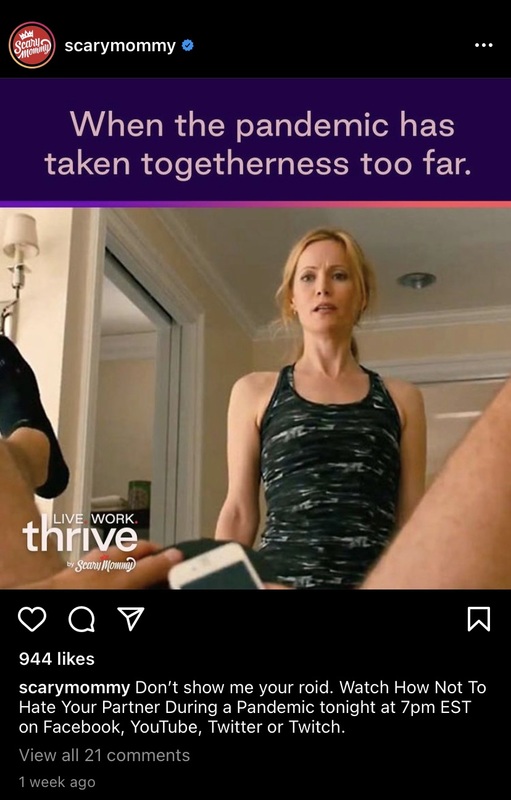 2021-02-23
2021-02-23Too Much Togetherness
They say humor is the best medicine and they weren't wrong. A lot of couples are spending a whole lot of time together recently with quarantines and social distancing orders. It was really cute at first, working side by side on laptops and having our morning coffee together. That got old real quick though. This funny take on "How to Not Hate Your Partner During a Pandemic" advises couples how to get through issues like working from home and homeschooling kids. -
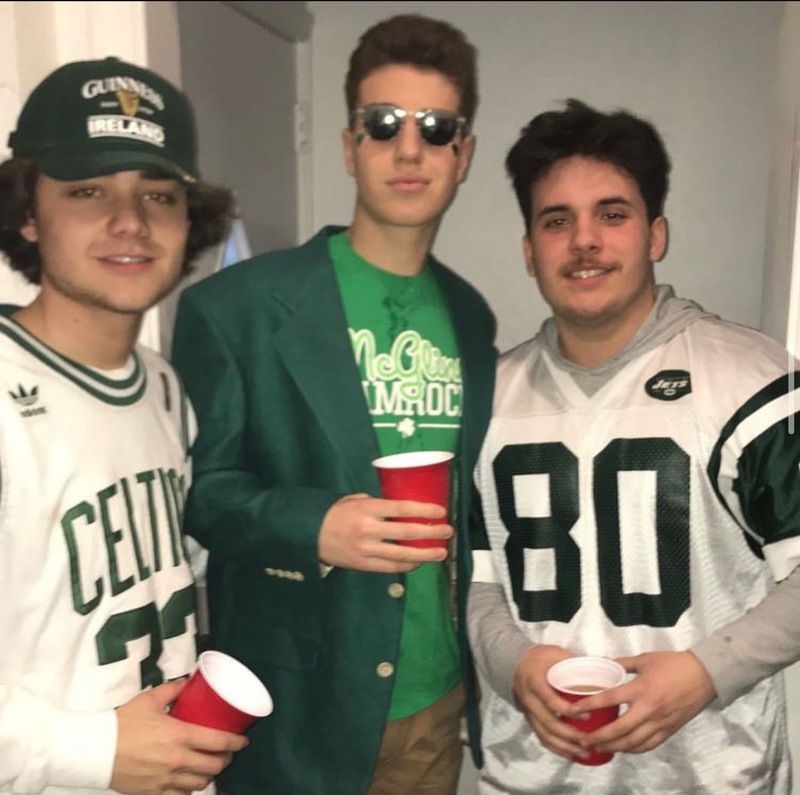 2020-03-14
2020-03-14Going Home
This story reads the story of the impact of COVID 19 on my life is important as it shows the transition from the normal world into the new covid world. -
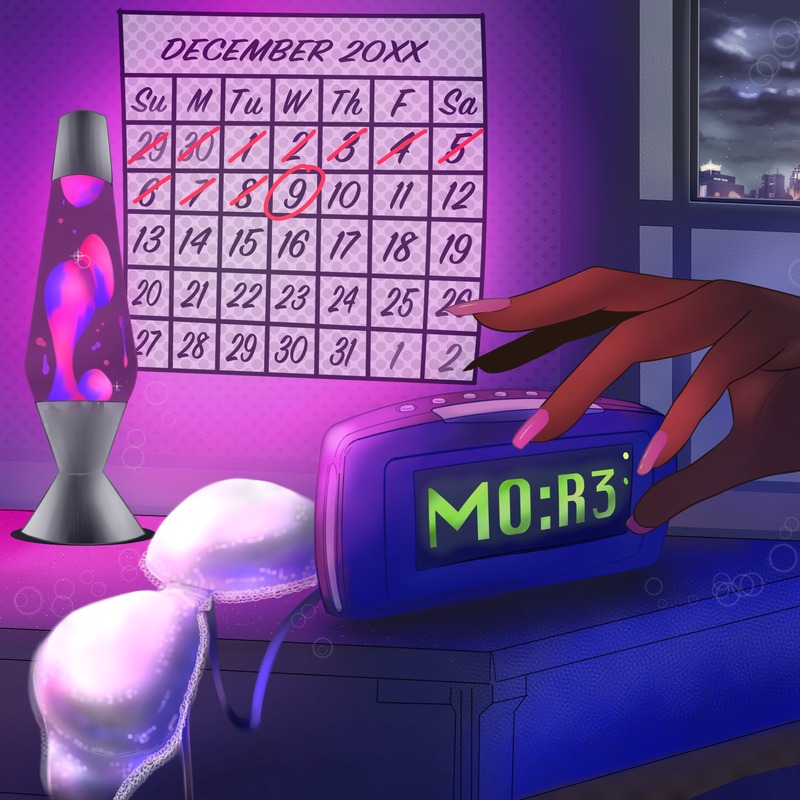 2020-07-04
2020-07-04Podcast In a Pandemic
During the pandemic, I've decided to create a podcast with my friends discussing relationships and social issues relating to men and women in their 20s. The idea came to us after we decided to turn our daily debates into content -
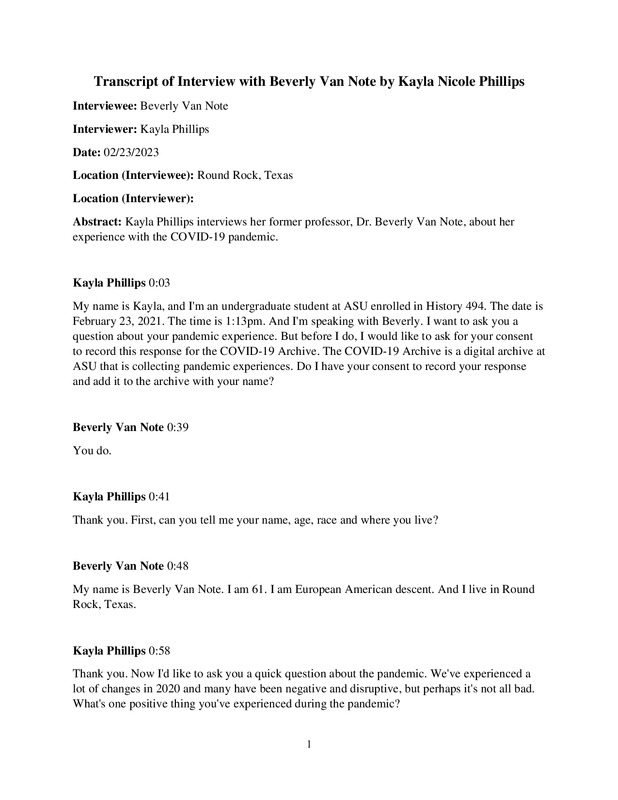 02/23/2021
02/23/2021Beverly Van Note Oral History, 2021/02/23
I recorded a mini oral history with my former professor Dr. Beverly Van Note. -
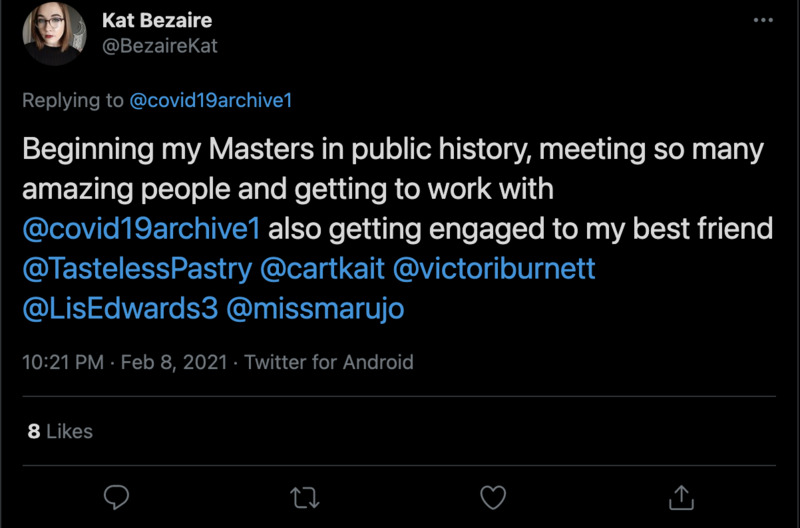 2021-02-08
2021-02-08#JOTPYSilver submission from Kat Bezaire
Beginning my Masters in public history, meeting so many amazing people and getting to work with @covid19archive1 also getting engaged to my best friend @TastelessPastry @cartkait @victoriburnett @LisEdwards3 @missmarujo -
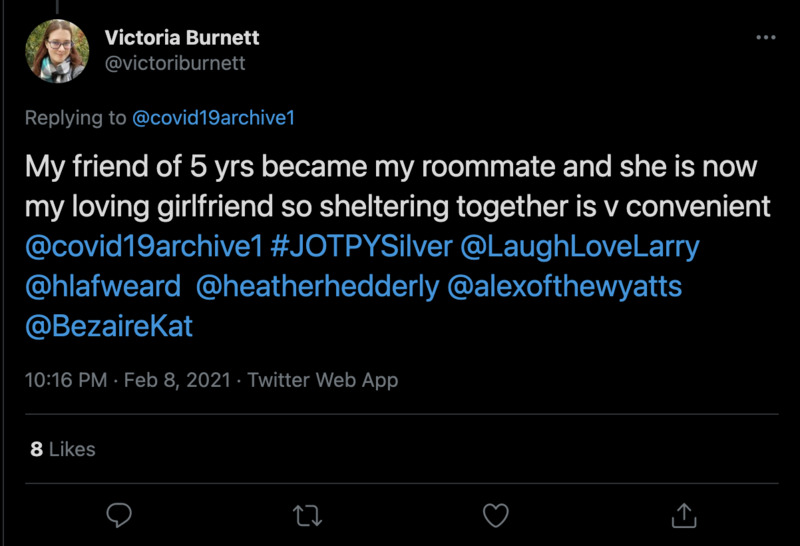 2021-02-08
2021-02-08#JOTPYSilver submission from Victoria Burnett
My friend of 5 yrs became my roommate and she is now my loving girlfriend so sheltering together is v convenient @covid19archive1 #JOTPYSilver @LaughLoveLarry @hlafweard @heatherhedderly @alexofthewyatts @BezaireKat -
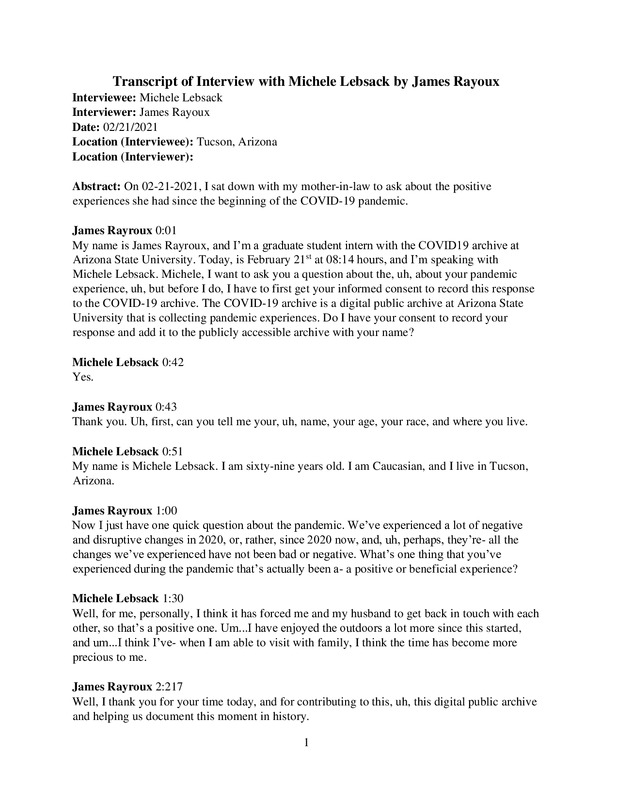 02/21/2021
02/21/2021Michele Lebsack Oral History, 2021/20/21
On 02-21-2021, I sat down with my mother-in-law to ask about the positive experiences she had since the beginning of the COVID-19 pandemic. -
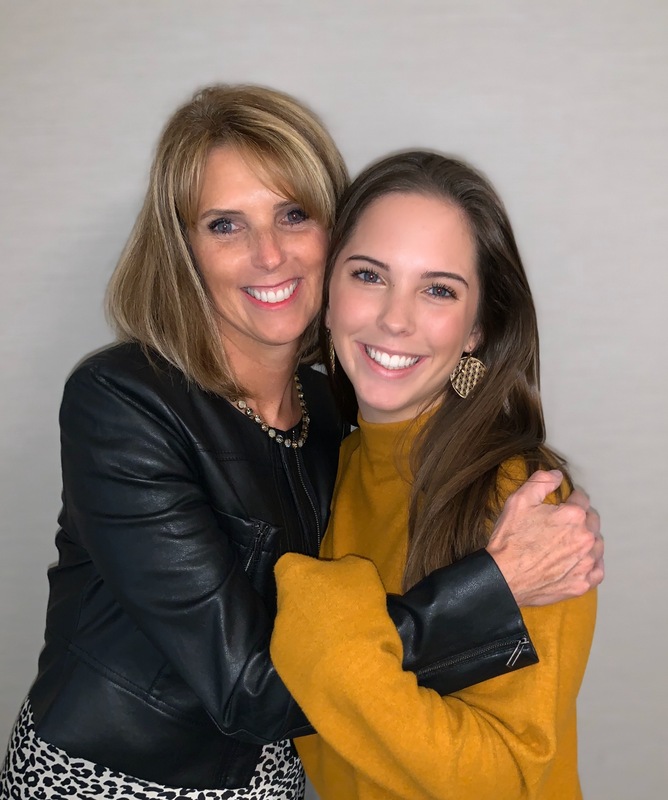 2020-04
2020-04COVID. A Blessing in Disguise?
The pandemic has allowed me to take a step back from everything in society to see what I truly care about and what truly matters to me. Not only what matters, but who in my life I love and care about that matters. The photographs I have attached show exactly who those people are. Throughout the pandemic I have made stronger relationships with my family. Although there were moments that it was hard spending time with just them 24/7. It was difficult knowing I could not see friends from home that went to different colleges during the year. This is because their parents were definitely stricter about COVID than my parents were. And I completely understood that, but it was tough not seeing one another knowing they were just five minutes away. To fill that frustration, we would have Netflix watch parties from our houses on our own computers so that it would feel as if we were all watching the same movie in the same room. Then after a few months we would take our dogs for walks outside, and that is shown in one of the pictures. We did this so that we could see each other while being able to properly social distance. It was just hard having to accept that for now it would be our new normal. Going home from Duquesne meant that all my friends from school would also be heading home. In another picture it shows a few of my friends and I all FaceTiming one another. We would all group FaceTime together just about once every day to play games and just catch up which also gave me something to look forward to. A positive that come from quarantine was being able to do workouts with my family three times a week. We never got to do this because I would be at school and my brother would be working. Two times out of the week we would work out at a local park near my house. Then every Saturday morning bright and early at 7 AM my dad’s trainer would pick a different sight throughout the city to work out at. This was something I definitely looked forward to once a week because typically we would just work out at the same gym. Now that the gym had to be shut down it allowed us to think outside the box. In one of the pictures it shows my dad, brother, his girlfriend and others that worked out at Point Park one freezing morning. It was definitely hard waking up on a cold morning, but having a change of scenery, being able to be outside and be physically active with some family and friends was nice and refreshing. We went to other destinations around the city too such as outside Hinze Field, PNC Park, and Pitt. In another picture is my mom and I. We have always been close, but with me being away at college COVID had allowed me to be around her more often. We would watch movies, cook dinner, and make fires together which was nice to be able to spend more quality time together. Overall, COVID was hard not being able to see certain friends that I have missed, but it had also allowed me to make stronger relationships with those I had not spent a lot of time with because I have been away at college. In some aspects I would say that COVID was a blessing in disguise for me and my family. -
 2020-04-03
2020-04-03The Game of COVID Life
During the quarantine, my wife and I were having a hard time trying to adjust to our jobs being remote. We were not used to staring at computer screens for 8+ hours. The feeling of stress was overwhelming. I’m sure everyone in the world can relate to this experience. We really needed something to raise our spirits after time passed by and the world was still shut down. When my wife and I first got married in 2019, we had a problem of spending money on board games of all kinds. We ended up with a collection of 47 board games by the time COVID started (we began our marriage with about 12 board games). The thing is, with our jobs (my wife being a Public Library Administrator and I being a teacher and coach), we hardly had time to play some except a few. Who would have thought that we were unknowingly preparing for a quarantine. Our collection helped us escape reality for a bit each time we played. Game nights became a regular occurrence and we still hold them to this day. We were able to connect more as a couple and strengthen our relationship. The sounds of dice being rolled, cards being shuffled, and game pieces being moved remind me how board games helped us cope with the unexpected changes in our lives and recharge our batteries to keep going forward. -
2020-09-22
COVID-19 benefits
This journal entry was written as a part of the American Studies class at California High School in San Ramon, California. Before this pandemic, I feel that I was constantly on the go and blind to many things. It was always go to school , do this, do that, and so on. Since quarantine, I have had lots of down time and have gotten the time to reflect on me as a person. It's been very refreshing slowing down my once hectic everyday life. Due to us being on lock down, I was able to open my eyes to a lot of things. I realized I was putting my energy places where it was unnecessary and trying with people where there was no try back. I had to figure out what relashinships really mattered to me and stop trying with those who show me no attention. Yes this pandemic is crazy but it has been very beneficial to me. I have grown as a person and bettered my mental state. -
2020-09-16
How I Stayed Connected With Friends Using Discord
When the lockdown started, my friends and I had no way to hang out in person. Luckily we can hang out over the internet by using Discord, the best online voice and video call program. We can play video games like, Apex Legends, Overwatch, and Rocket League. It's great that we can still be together while separated. -
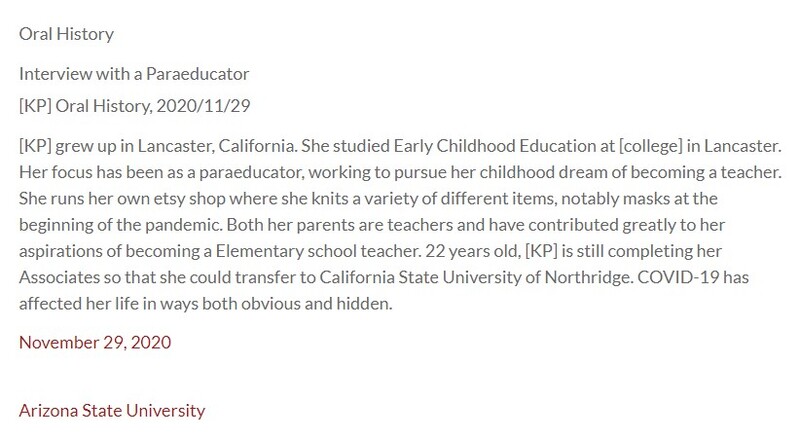 2020-11-29
2020-11-29Interview with a Paraeducator
The contributor of this item did not include verbal or written consent. We attempted to contact contributor (or interviewee if possible) to get consent, but got no response or had incomplete contact information. We can not allow this interview to be listened to without consent but felt the metadata is important. The recording and transcript are retained by the archive and not public. Should you wish to listen to audio file reach out to the archive and we will attempt to get consent. -
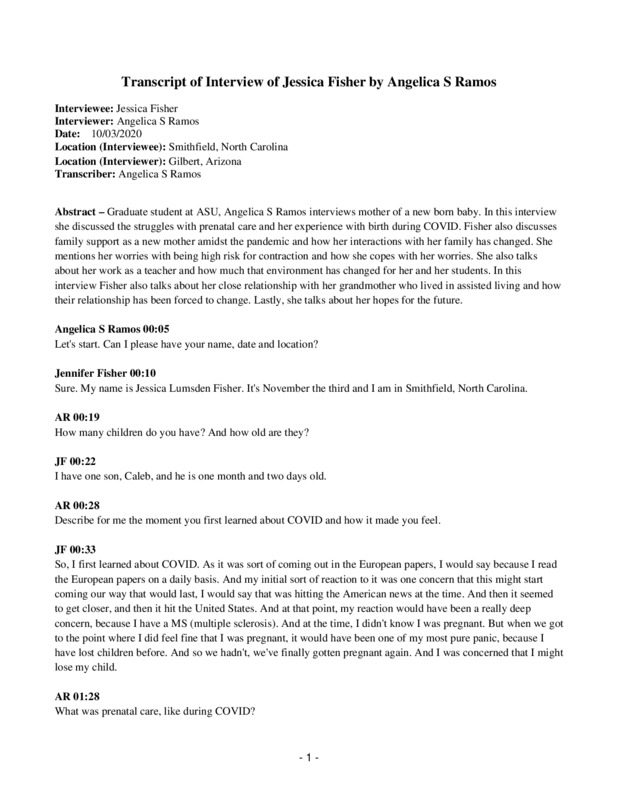 2020-10-03
2020-10-03Jessica Fisher Oral History, 2020/10/03
Graduate student at ASU, Angelica S Ramos interviews mother of a new born baby. In this interview she discussed the struggles with prenatal care and her experience with birth during COVID. Fisher also discusses family support as a new mother amidst the pandemic and how her interactions with her family has changed. She mentions her worries with being high risk for contraction and how she copes with her worries. She also talks about her work as a teacher and how much that environment has changed for her and her students. In this interview, Fisher also talks about her close relationship with her grandmother who lived in assisted living and how their relationship has been forced to change. Lastly, she talks about her hopes for the future. -
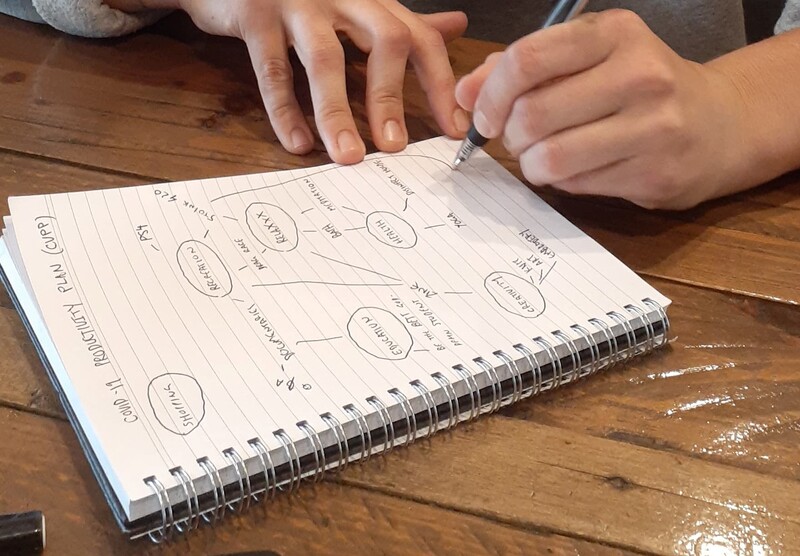 2020-03-12
2020-03-12COVID-19 Productivity Plan
HIST30060: A ‘COVID-19 Productivity Plan’ in the making. In the early days of the pandemic, my girlfriend and I were excited about entering lockdown. An eventual lockdown felt inevitable in mid-March, so we sat down at our local café to plan all the things we hoped to achieve. The plan reflects the sense of novelty and strange excitement many experienced in the beginning. -
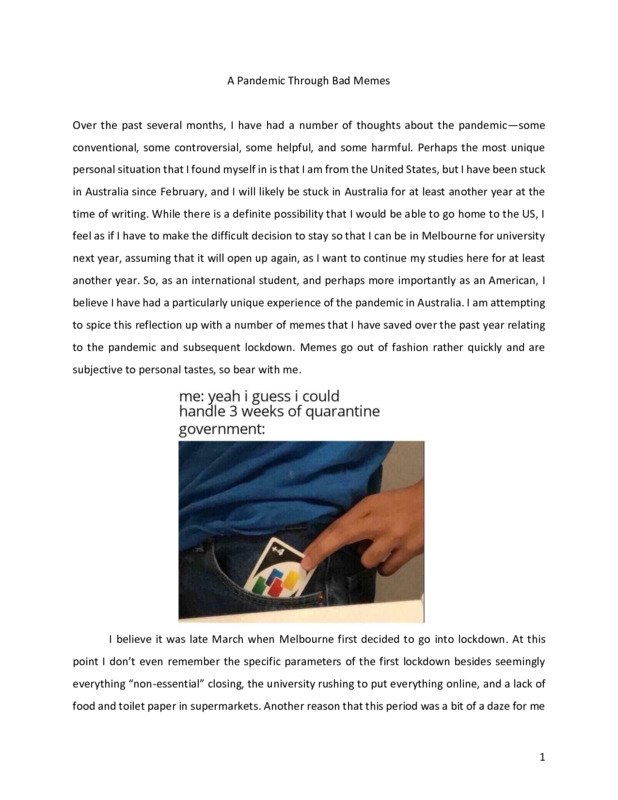 2020-10-17
2020-10-17A Pandemic Through Bad Memes
HIST30060, this is a personal text reflection on my experience in the pandemic complemented by internet memes -
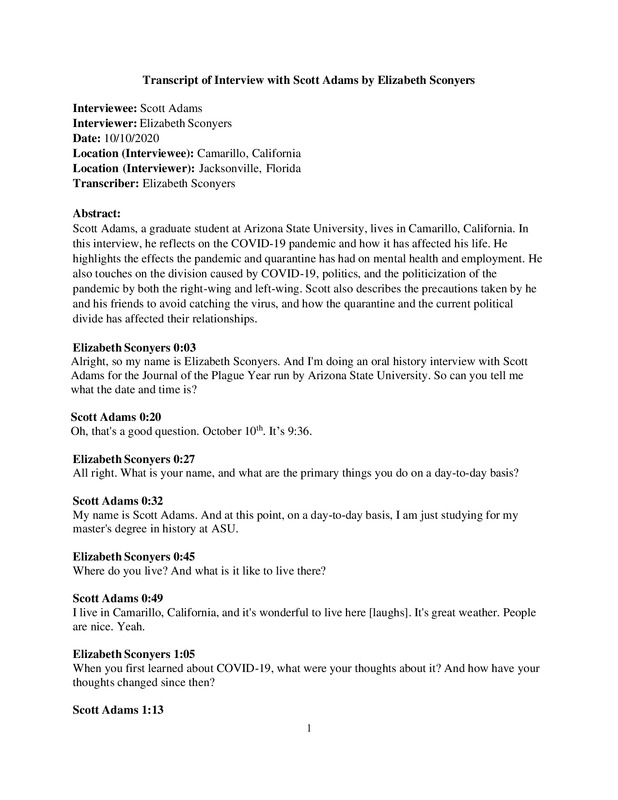 10/10/2020
10/10/2020Scott Adams Oral History, 2020/10/10
Scott Adams, a graduate student at Arizona State University, lives in Camarillo, California. In this interview, he reflects on the COVID-19 pandemic and how it has affected his life. He highlights the effects the pandemic and quarantine has had on mental health and employment. He also touches on the division caused by COVID-19, politics, and the politicization of the pandemic by both the right-wing and left-wing. Scott also describes the precautions taken by he and his friends to avoid catching the virus, and how the quarantine and the current political divide has affected their relationships. -
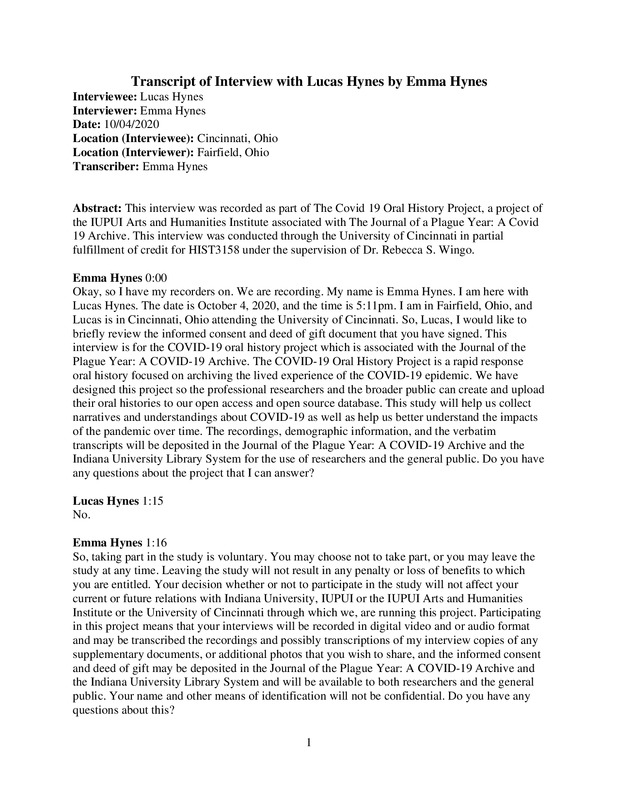 10/04/2020
10/04/2020Lucas Hynes Oral History, 2020/10/04
In this Oral history, I interviewed my brother Lucas about his experiences during the COVID-19 pandemic. He is a freshman at the University of Cincinnati, and the interview focuses on that part of his identity. It begins with us talking about campus life in general. We also discussed his perceptions of COVID-19 both at the beginning of the pandemic and now. His perceptions have not changed much, although he believes that it’s important to listen to scientists as new information is released. We then talked about government response to COVID-19, as well as the response at the University of Cincinnati. Finally, he discussed things he felt he has missed out on because of the pandemic, and what he thinks school will look like going forward. -
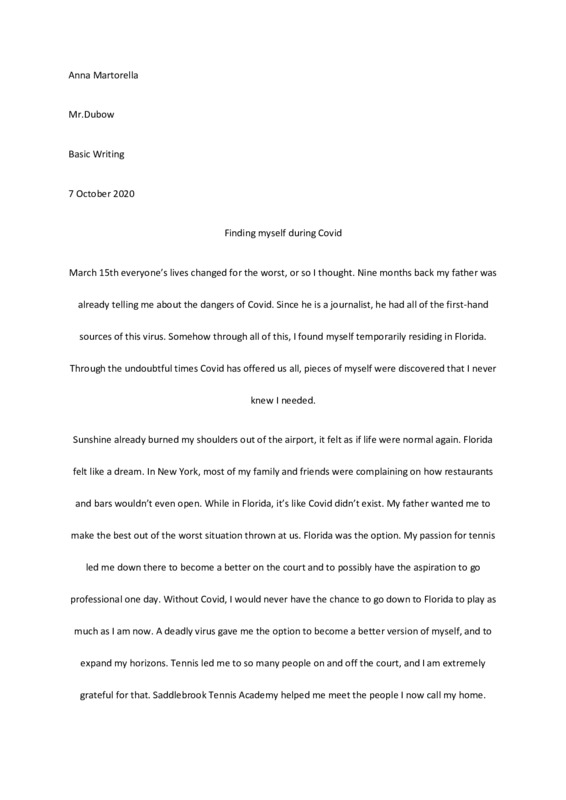 2020-03-16T12:00:00
2020-03-16T12:00:00Finding Myself During Covid
My story discusses how throughout Covid , I found a way to make it positive. A global pandemic turned millions of lives upside down. But, I won't allow this disease to kill off my dreams with tennis. -
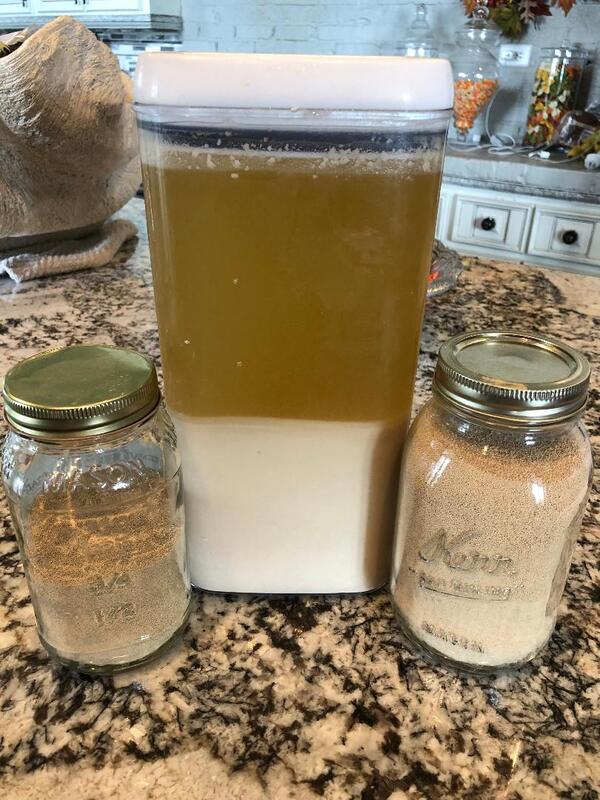 2020-10-12T09:40
2020-10-12T09:40Our Six-Week, COVID-19 Baking Crisis
My wife and I were both home from our jobs by mid-March because the COVID-19 pandemic had, for all effective purposes, practically shut down our home state of Alabama. During our long sequestration from the world, we often baked together to pass the time. Tamsie has a sourdough bread starter that was handed down from her grandmother, so to keep the starter “alive”, she has to bake bread every month or so, which of course requires yeast. I believe that millions of Americans were at home baking during that time because we were out of dry yeast for her bread and, though we searched every grocery within a 20-mile radius of our home, we looked to no avail; additionally, yeast was back-ordered on Amazon, Walmart online, and every other online store. We were beyond desperate for that yeast, and the starter had to be near death when, at long last, I discovered an in-stock yeast on Amazon and ordered six pounds of it. Needless to say, I ordered entirely too much and thus unintentionally became that obligatory hoarder with which we’ve all had to deal during the last seven months. Thus, we had to bake dozens of loaves of sourdough bread to use that yeast! My wife is a dentist, so we baked bread for all her employees and left it on both their front porches and garages. We also baked for our neighbors and our families. The sweet smells of sourdough bread and sticky buns filled our home for nearly six weeks, as baking became an inane, daily ritual in the Rogers household! Today, whenever I smell fresh bread or cinnamon rolls, I think of our time spent together with our puppies in the kitchen, laboriously prepping, waiting for the yeast to rise, baking, and cleaning on a daily basis. I am thankful for this time, and though we now laugh about and much fun is had at my expense over my overzealous yeast spending-spree, whenever I smell fresh bread, I will forever be transported to our happy kitchen along with its aromatic sights and smells during the early weeks of the pandemic. It is truly amazing to ponder what we take for granted in our daily walks, and though I am obviously glad we are standing on firmer ground than in spring in relation to COVID-19, I miss our time together in the kitchen, which seems lonely and destitute without the sweet aroma of fresh sourdough bread. My association with this simple, yet happy memory during the pandemic is reflective of the joys we should be seeking in small things. Our daily lives are measured by our relationships, our serenity and contentment, and the joy we both provide and glean from others. The extended time at home with Tamsie allowed us a “factory reset” of sorts in our lives, one that brought our already-happy marriage much closer together; consequently, we no longer take life’s simple, quiet moments for granted. In some ways, the lasting human effects of the pandemic on relationships have been positive, in that each of us has had ample time to again focus on those whom we love. -
2020-10-11
In the Pandemic Journey
I am an international student from Colombia. I was in the middle of my fourth semester as a sophomore in college when I heard that the pandemic hitting the world just entered the U.S. I was excited at the time because my girlfriend and I bought tickets to go to New York City during spring break. I thought we were going until I heard that New York City was a hot spot for COVID-19. We did not want to risk anything, especially if we were going to encounter a virus that was completely unknown to us, so we cancelled the trip, but the airline still gave us the tickets to fly anytime between then and the end of 2022. After that, spring break came, and it was announced that the university was closed after spring break and we would have to go completely online. I live with my girlfriend since I first came to the U.S., so I stayed with her at her home that is two hours from the university we are enrolled in. We finished the rest of the semester there at her home. We then stayed for another month there and while we were in complete isolation we took advantage of that to go running together to be healthy, we did not let ourselves get bored, we were always doing something, we would do zoom video calls with our friends, watch movies, play video games, etc. After that we came back to Stevens Point to work on campus for the summer (with the required restrictions) so we could make some money to pay for our tuition. Though this is considered by many one of the worst years they’ve lived in, I had the most fun summer since I first came to the U.S – me, my girlfriend, and our friends had a blast; we hung out almost every day, we went to isolated beaches and went on boat rides, we had bonfires, we partied amongst ourselves, we went hiking, we went biking, we played soccer, etc. When the summer was over, we went back to classes and I got also got interested in learning new languages, so I downloaded the app called Duolingo to learn Portuguese and practice some other languages. Since Spanish and Portuguese are so similar, I am quickly picking up the language. I started my junior year in college, and I could not be happier with the classes I picked. My girlfriend and I thought that since we have classes online and more time at home, it would be the perfect time to get a dog, so we adopted a Doxiepoo, the combination of a Dachshund and a miniature poodle. She is 4 months and we have had a lot of time to train her and we couldn’t be happier with her. Everyone has their ways of coping, and with this ongoing journey through a global pandemic, I have learned that my way of coping is not only adjusting to the situation but also taking advantage of the variety of opportunities that arrive and make the best out of it. This pandemic has taught me in a way that just because we are adjusting, we should not stop living in the moment and while I understand that for some people this pandemic might be harder, it is up to us to either make it a living hell or make it one of the most memorable experiences of our life. -
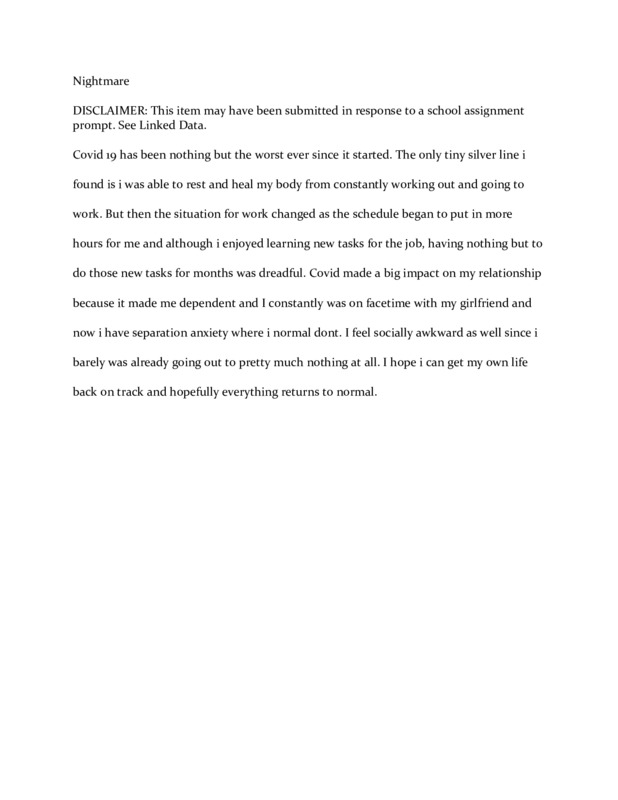 2020-03-16
2020-03-16Nightmare
Covid 19 has been nothing but the worst ever since it started. The only tiny silver line i found is i was able to rest and heal my body from constantly working out and going to work. But then the situation for work changed as the schedule began to put in more hours for me and although i enjoyed learning new tasks for the job, having nothing but to do those new tasks for months was dreadful. Covid made a big impact on my relationship because it made me dependent and I constantly was on facetime with my girlfriend and now i have separation anxiety where i normal dont. I feel socially awkward as well since i barely was already going out to pretty much nothing at all. I hope i can get my own life back on track and hopefully everything returns to normal. -
2020-09-27
Introvert to Extrovert
As an introvert, I was not initially too burdened by the pandemic. I usually preferred to be alone anyways and being stuck at home sounded like a dream come true. However, throughout the pandemic I found that I relied more heavily on interpersonal interactions than I thought I would. I was living with roommates, but most of them went home to their parents for the initial stages of the pandemic. To cope with this, I started to practice mindfulness. I determined it would be helpful to connect, and create a tight bond, with my “inner self”. This practice was extremely helpful, and I felt a spiritual connection with myself that I have not in a long time. It also helped me manage other forms of anxiety that I have felt in the past. I now feel a deeper connection with myself, and after this experience, I feel a deeper connection with others as well. It used to feel like work to be around people, but now I relish in the ability. I think this is because, over the course of the pandemic, I have been able to connect with myself at a deeper level. Now that I feel more comfortable in my own skin, I can interact with others in a more mature and less paranoid way. Overall, this pandemic has really changed how I feel about the other people in my life. I have always enjoyed my friends and their company, but it was something I needed an occasional break from. After this experience, I have realized that I need my friends. They are not just a group of people I spend time with to have fun. They are a group of people that I have a real emotional bond with, and we need each other to help strengthen that bond. Especially during difficult times like these. -
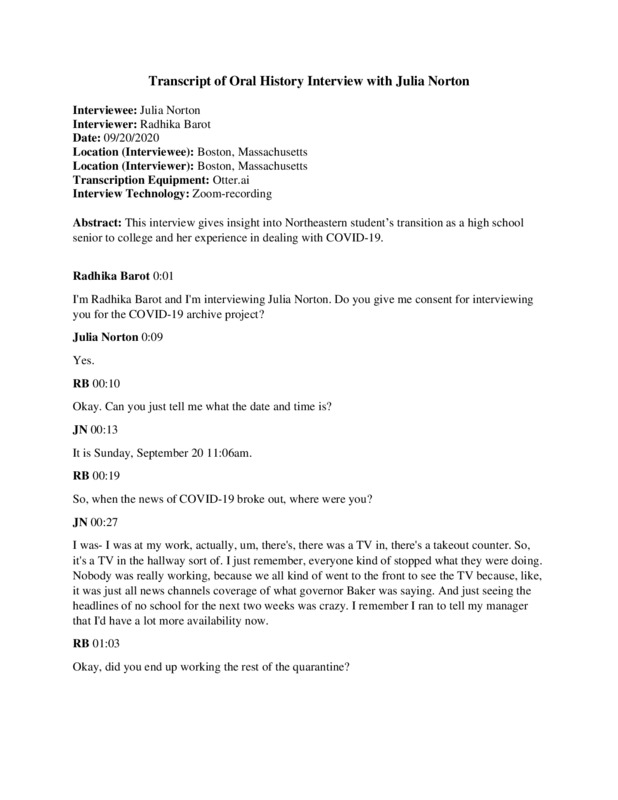 09/20/2020
09/20/2020Julia Norton Oral History, 2020/09/09
This interview gives insight into a high school senior's experience with dealing with Covid-19. *This interview is about Julia's experience and perspective on the Covid-19 outbreak.
